James Patterson preached this sermon on July 4, 1825 in Philadelphia.

A
SERMON
ON THE
EFFECTS OF THE HEVREW SLAVERY
AS CONNECTED WITH SLAVERY IN THIS COUNTRY
PREACHED IN THE 7TH PRESBYTERIAN CHURCH IN THE
CITY OF PHILADELPHIA, AT AN UNITED MEETING
OF CHRISTIANS OF DIFFERENT RELIGIOUS
PERSUASIONS
TO CELEBRATE OUR NATIONAL INDEPENDENCE
JULY 4, 1825.
BY THE REV. JAMES PATTERSON,
Pastor of the First Presbyterian Church in the Northern Liberties.
ADVERTISEMENT.
We have yielded to the solicitations of the friends of religion; that the sermon delivered on the 4th of July, on SLAVERY, be immediately given to the public. And though owing to feeble health, and the extreme heat of the season, it was not prepared as it ought to have been – being got up for the particular occasion – Neither now can it be revised, as we could wish, before publication – Yet if there be anything in it that will add to the great cause of CHRISTIANITY and the RIGHTS OF MAN, we cheerfully yield it – and the glory be to God.
We believe that there is an excitement among Christians throughout the world, on the awful subject of slavery, such as never was since the commencement of the Christian era. And whenever the saints shall take hold of this subject as they ought, as sure as the sun shines SLAVERY must come to an end; and all its abettors, if they persist in it, will be destroyed.
We have added some things in an appendix; exhibiting the present state of slavery – in the exertions making for an universal emancipation – and its practices among the ancient pagan nations – and something of its origin.
JAS. PATTERSON
A SERMON, &c.EXODUS IV. 22,23.
THUS SAITH THE LORD – LET MY SON GO, THAT HE MAY SERVE ME, AND IF THOU REFUSE TO LET HIM GO, BEHOLD, I WILL SLAY THE SON.
Christian Brethren,
We are assembled today to commemorate one of the most glorious events recorded in our history: and we would here take occasion to give thanks to God that American citizens begin to celebrate this day in the sanctuary, instead of the places of sinful revelry. But while offering up our prayers and thanks to our Great Deliverer for our political redemption, Fellow citizens will you suffer us to remind you of a race of beings at our own firesides, wearing a chain much more galling than that of our fathers, when with their hearts up to heaven, and their swords in their hands they resolved to die, or be free.
It has always appeared to us equally incongruous and unchristian to assemble together to hear our Declaration of Independence read, while we at that very moment are holding men in slavery – and men whose blood is the same with that in our own veins.
See two men at the same door – of the same blood – of the same Creator – one mounts his horse, rides off to celebrate his independence, pouring forth the best feelings of his heart for his liberty – the other, perhaps at that very moment a chain sinking in his flesh, goes off to his hard work of bondage, pouring forth the direst execrations of his heart against the man who constantly deprives him of his liberty.
Those scriptures connected with the text teach slave holding nations one of the most awful lessons, ever taught by the God of nations. Where see one of the greatest nations then in the world holding in cruel bondage, a people who by the Providence of God were thrown into their country. Egypt had grown wealthy – lustful, and infidel, on the sweat and blood of the Hebrews. Such is the effect on the masters. And the effect on the slaves was to make them ignorant of God so that they began to cease to answer the great end of their creation. Hence that just and righteous demand from heaven, Let them go that they may serve me.
That criminal ignorance of God was the effect of their “bondage” is abundantly taught in their future history, by their worshipping the ox or golden calf, which idolatry they had learned in Egypt it being part of the worship of the country; for almost every great city in Egypt at that time had its Apis 1 or ox as an object of religious worship.
But to a people not gearing God, this was a reason of no weight – they refused to let the people go.
Nay from first to last, whenever there was any conversation on the subject of their emancipation, or plans forming it, the Egyptians immediately increased their bondage; entering into counter-plans to crush them: “Come” say they “let us deal wisely with them, lest they multiply and it come to pass, that when there falleth out any war, they join our enemies, and fight against us and so get them up out of the land. Therefore they did set over them task-masters to afflict them with their burdens – and they made their lives bitter with hard bondage in mortar – in brick, and in all manner of hard service in the field. But the more they afflicted the more they grew – and this grieved the Egyptians [Exodus 1:10-12].
Then they had recourse to another stratagem; and an awful one it was. – It was this. To cut off the increase of population by destroying the male children – so brake the arm of their power and holding safe bondage forever what salves they already had. 2
This seemed to put the climax upon the oppression of the oppressor. – It was a plan for an eternal servitude. Now they seem to have lost all sight of their slaves as human beings. – But at this awful crisis the groans of the bondman penetrated the abode of Him who has commanded, “be fruitful, multiply and replenish the earth.” God heard – God raised them up a deliverer. It was Moses. About this time he was born. His birth, preservation, and education was altogether of God.
And when we see him, who was to the future liberator of his countrymen, lying a helpless and hopeless infant, amid the rushes and alligators of the Nile; who will dare to say that he was not raised up as their deliverer?
And who else of all the men of the earth ever had disinterestedness enough, to refuse a crown and kingdom, and identify himself with his countrymen to die, or to be free?
For when he came to years he refused to be called the son of Pharaoh’s daughter [Hebrews 11:24], refusing the crown of Egypt. 3 Quitted the place for the fields where his countrymen were in chains – and seeing one of them cruelly scourged or “smitten” by an overseer, his indignation was kindled he instantly interfered – and in the scuffle he killed the Egyptian. This coming to Pharaoh’s ears he sought to slay Moses, but he fled the country. Fain would the patriotic arm of Moses have sundered the chains of his countrymen – But Egypt’s cup was not yet full O Egypt! Unhappy Egypt! Forty years more ingredients are to be poured into the cup of thy misty! And this patriot – this man of God – though raised at the court educated for the throne, and of great power in Egypt was hunted 4 from the dominions of slavery.
Such their determination to hold their slaves. Full well they knew their slaves were their wealth. Yea, the monuments of the arts, were all extracted out of the very sweat, blood, bones, and sinews of the Hebrew slaves. – ’Tis well known that some of their finest cities 5 were built by the Israelites – to what other end could they have appropriated such an immense quantity of brick as their slaves made?
And after forty years of instruction by God, for a work so difficult and so arduous, Moses was sent back with the commission in our text.
We call it a work difficult and arduous, for scarcely ever has a long standing system of slavery been broken up without scenes of blood and carnage.
A great increase of power over others never yet has made men humane and benevolent; but generally leads to cruelty and oppression. David and Solomon both speak of this fact as notorious in the history of men – And with the exception of Washington and Bolivar perhaps there is not another instance on record, where such great power was laid down peaceably at the feet of the people. And every attempt to arrest out of the hands of men, ill-gotten and overgrown power, from whatever source it comes, even from God himself, only makes the oppression of the oppressor greater.
This is painfully verified in the present case – for when God sent back Moses to Egypt with that most reasonable command, “Let my son go, that he may serve me,” what was the effect? Who is the Lord said Pharaoh, that I should obey his voice to let Israel go? I do not know the Lord, neither will I let Israel go [Exodus 5:2].
Here is the core of the contest, God will rule – God must rule, and this impious oppressor would not submit to it. I know not God, says he, neither will I let the people go. Wherefore do you, Moses and Aaron, let the people from their works, GET YE TO YOUR BURDENS, and the same day he commanded the task-masters saying ye shall no more give the people straw as heretofore; let them go and gather straw for themselves; and the tale (or number) of the bricks which they did make heretofore ye shall lay upon them; ye shall not diminish ought thereof [Exodus 5: 4-8] And when they could not make the same number of bricks per day, because they had to hunt the stubble throughout the country, and carry it great distance, they were unmercifully beaten.
“Let my son go that he may worship me.” Was this an unreasonable demand? The God of mercy had seen their cruel oppression. They were his creatures. – He had a right to demand their release – but did they let them go? No – and did God execute His threat? Yes; and to this very day, which is about forty hundred years, that nation has never recovered from that stroke. 6
And now what imagination can possibly describe the heart-rending effects of that stroke upon the land of Egypt, which those slave masters provoked from the Almighty. To make the scene more terrific it was at midnight. Behold says the sacred historian “it came to pass that at midnight the Lord smote all of the first born in the land of Egypt, from the first porn of Pharaoh that sat on his throne, unto the first born of cattle – and there was a great cry in Egypt – such as there was none like it; nor shall be like it any more, for there was not a house wherein there was not one dead. Thus he broke the chief of their strength in the tabernacles of Ham.” [Exodus 12:29-30 & Psalm 78:51]
And is this the effect of slavery, upon slave-holders when persisted in against reason and revelation? Moses had reasoned with them – and of revelation they could not have been entirely ignorant. Joseph, that eminent saint, having lived so long among them – and if they had, God had revealed his own arm before their eyes in the plagues that threatened their destruction. But they would not be taught. And alas this was but the beginning of their sorrows. – The finishing stroke – the death of Egypt, was at the Red Sea –there was buried all the strength and flower of the nation – and their wealth and their wrath were together engulfed in the waves – and there tale of woe, the funeral of the nation, is talked of on those shores till this very day.
Six hundred chosen chariots and all the chariots of Egypt, and captains over every one of them, and an immense cavalry, all sunk to rise no more [Exodus 14:7]. – Yes says the sacred historian, there remained not so much as one of them [Exodus 14:28].
And it would seem that to this very day she has never risen from that stroke. “About this time the Egyptian historians place an invasion of their country by swarms of Phoenician shepherds. But who these shepherds were, whether Amalekites, that fled from Chedorlamoer, or Canaanites, who fled from Joshua, or Arabs, we cannot possibly determine.” – Brown’s Dict. Bib.
Soon after that it was prophesied that the “pomp of her strength should cease in her – that she should become a base kingdom – yea the basest of the kingdoms – that she herself should go into captivity, and there should be no more a prince of the land of Egypt – and that many of her cities should suffer extremely and groan.” 7
And from within a few years after this prophecy was delivered until now. Egypt has been groaning, being governed by foreigners and tributary to other nations.
And what is she this monument but a nation groaning under most severe degradation and misery. 8
She was long the most renowned kingdom in the world; but having first, grievously oppressed the people of God – then seduced them – then deceived them – this blasting decree of heaven went forth against her, “and the pomp of her strength has ceased.” She was conquered and subdued successively by the Babylonians, Persians, Macedonians, Romans, Saracens, Mamelukes, and lastly the Turks, to whom she remains in the most abject servitude to this day. Thus for more than 20 centuries they have been a base and tributary kingdom; and during all those ages they have not been permitted to live under princes of their own race. On one occasion God sold all Egypt to a foreign prince for performing a piece of service to Him. 9
It would indeed be interesting to know, if the pages of history could be accurately turned over and read, whether some of the posterity of those very kings that oppressed the Hebrews, were not now living in the most debasing slavery.
Now Brethren, if there be anything in North America similar to the bondage of Egypt; ought not this country to learn a lesson from their destruction. And though that bondage may not exactly coincide with the slavery among us, yet is there not a coincidence enough to teach us to fear that this country will one day suffer if we do not repent of our cruelty in African slavery.
And I appeal to every citizen if this is not the public sentiment; both as it regards, the most Godly men among us, and the wisest statesmen, viz. that America must suffer; if something is not done and that speedily too, to release from the most cruel bondage, more than a MILLION 10 AND A HALF OF IMMORTAL BEINGS, whom she holds in chains, and that both soul and body, that they cannot serve God.
With the increasing growth of Christianity among us, it is impossible that slavery can exist. Christianity and slavery cannot be identified. For truly if we measure slavery by the enormity of its crimes and sufferings; it is the greatest practical evil that ever afflicted the human race.
Yes Says Mr. Jefferson, “The love of justice and the love of country plead equally the cause of this people, and it is a mortal reproach to us that they should have pleaded it so long in vain. The hour of emancipation, (says he,) is advancing in the march of time; it will come, whether brought on by the generous energy of our own minds, or by the bloody process of St. Domingo.”
We would now then say to every slave holder in the United States, in the language of the Almighty to the slaveholders of Egypt. “Let go my son, that he may serve me; and if thou refuse to let him go, behold I will slay thy son.”
Now, if it be true that slavery prevents any people from answering the great end of their creation, i.e. to serve God – and if it be true that God has made all the nations of the earth for that service – and no man will deny either – then He is in justice, in reason, and in revelation, bound to demand the release of any people from servitude – but particularly so, when a Christian nation keeps His creatures from serving Him as they ought.
Now there are three things we would present to every slave-holder in this country.
1st That he let go his slaves, that they may receive an education and become useful citizens, and so answer the end of their creation. Knowledge is power, and if rightly used makes a good citizen – and without some considerable degree of it, a man never can be a good citizen. Ignorance begets vice. And who will deny that this power is eternally wrested out of the hands of the slave? I appeal to fact – into what schools and colleges do we send our slave children for education? Who will deny that the masters find it necessary to keep them in ignorance? And to this end, have enacted laws time after time. Educate them and they never can be held in slavery. Such is the nature and power of enlightened intellect. Who ever heard of a million of educated and enlightened men held in slavery? What page of history records it?
To retain them in slavery then, it is necessary to keep them something like brutes – the mind; the immortal mind is to receive no food; but crush it; and bury it; and the deeper it is buried the better the slave- the less he knows about the rights of man the better for the master – My God! My God! Is this the humanity of man to man?
“Man’s inhumanity to man, makes countless thousands mourn.”
It is the glory of this Christian land that such liberal provision is made for education.
“It is now nearly 200 years since school funds were established in this country, by that aboriginal and immortal hive of intelligence, piety and self government, the Plymouth Colony. And by the constitution of the United States, it is the duty of government to promote the progress of science and the useful arts. Not one of the eleven states has been admitted into the union without provision in its constitution for schools, academies, colleges and universities. In most of the original states large sums in money were appropriated to education. Reckoning all these contributions, federal and local, it may be asserted that nearly as much as the whole national expenditure of the United States is set apart by law to enlighten the people of this country.” 11
And all of these millions spent in educating our citizens, to enable them to be good citizens, is there naught to be spent on the poor African? Must he and his posterity be doomed to eternal ignorance? Of the thousands that he helps to pour into the public treasury, must he never reap anything? Must he forever be deprived of the fruit of his own hands? And will heaven always wink at this? O heaven! Righteous Heaven; remember injured Africa!!!
How, then, are they to become good citizens? – Deprived of everything necessary to make them such shut out by Christians from all knowledge – all information – all mental food – doomed forever to a dwarfish growth in the great forest of mankind, and good for nothing but to curse and impoverish the earth.
Look at the natural soil 12 where they live, and see how it is cursed and impoverished under their very feet.
“Besides more than half a million educated at our schools, there are more than 3000 graduates annually matriculated at our colleges and universities – not less than 1200 at the medical schools – several hundred at the theological schools – and at least 1000 students of law.” 13
Now, all of these colleges, theological and medical, which of them ever opens their doors to the sons of the African? Heaven has given him talents to be a good citizen – yea even a statesman – but the white man has deprived him of this privilege. Then let my son go, says God, that he may serve me as a good citizen of the earth. And if thou refuse, behold I will slay thy son.
2. Let him go forth from that felness of despair in servitude, which calls forth all the hellish and murderous passions of the heart, and makes a many a very fiend on earth.
There is a period in slavery that may be called the very felness of despair; when the poor suffer, long galled prefers death to these chains; then in the paroxysm of his rage nothing is too hellish for him to plot and to perpetrate. One vast and indiscriminate massacre of men, women and children is plotted, and sometimes effected too – witness St. Domingo. 14 Now this is a degree of exterminating hellishness that is enormous. No man can read the bloody horrors of St. Domingo without asking himself what could excite such fury in a being, made in the image of God. The answer is, provocation and oppression – iron handed oppression. And ‘tis the insanity of despair, ruthless as hell against its oppressors. Then let every slave master let his slaves go, that they may fear God and regard the lives of their fellow men; and not be provoked to act out this fiend like temper.
3. Let them go, that they may acquire a religious education to serve God. Who will deny that the slaves in this country are kept in such ignorance 15 that they cannot intelligibly worship God – that there are exceptions, masters who allow them to be, or have them religiously taught is freely admitted. But is this the case generally? Are they instructed in Christianity as the whites are? No man will affirm this. Slavery, 16 as a system, knows nothing of religious education. Her voice is this, Who is the Lord that we should serve him? Nay, it not only degrades and depresses the mind, but restrains the expansion of the faculties, and stifles almost every effort of genius; so that after ages of oppression, slaves seem almost as a race of beings endued with capacities inferior to the rest of mankind.
This is an item in slavery which we believe of all others is connected with the deepest curse, and that both to master and slave: viz. that it operates in keeping so many immortal beings from all the practices of Christianity, by which they are to prepare for eternity.
If then they are held fast in a situation, in which they cannot serve God as they ought, His demand for their release is a most reasonable one, “Let my son go that he may serve me.” And although they are not God’s son exactly in the sense that Israel was, nor their slavery exactly the same, yet they are God’s rational creatures – He made them – and they are bound to serve him according to the best of their powers – and woe, woe, to the man or the nation that interposes between an immortal soul and its service to its Creator!! Let such remember Egypt and the Red Sea!!
And now Brethren, all the objections that can be possibly brought against universal emancipation, I answer by that single precept of Christ, Matt vii 12. All things whatsoever ye would that men should do to you, do ye even so to them: for this is the law and the prophets. This is a summary of all Christian duty towards our fellow men. And not now only, but Christ declares it was so from the beginning. This is the law and the prophets, says he, i.e. the substance of christen duty towards our fellow men as taught in the law and the prophets – but the law and the prophets make up the whole bible down to that time; therefore the bible down to the days of Christ did not authorize slavery; and no man will dare to say that the New Testament authorizes it; consequently by induction, revelation nowhere authorizes slavery. But expressly forbids it; commanding in the most positive manner that the man stealer shall be put to death.
Now if it be wrong to steal a slave, it is then wrong to hold a stole slave. This is a principle recognized both by the laws of God and man, viz. that he who receives and holds the stolen goods, if he knows them to be stolen, is as party concerned with the thief. It is in a degree identifying our interest with his, and taking part of his crime upon us. “When thou sawest a thief, thou consentedst with him.” [Psalm 50:18] Our consenting to the thing is what connects us with him in his guilt. Then to hold a stolen man in slavery is substantially the same crime as to steal him. For if it was wrong to deprive him of his liberty in the first instance, it is equally wrong to deprive him of it in the second.
The slavery we speak of, and of which we have been speaking all along, is the third of three kinds – 1st. A person may become a slave by their own consent for a time. 2nd May be made so by the government, as a punishment for crime. 3rd. Made a slave by force, and held so forever through all their posterity.
This third and last is the kind of which we have been speaking, which Revelation never did authorize and reason cannot.
In favor of slavery there is plausible argument, the deceitfulness of which is not immediately seen. Permit us to analyze it a moment. The argument is this, viz. That the African slave is in a more eligible state 17 in this country, enjoying the Christian religion, that he would be were he a free heathen in his native country 18 i.e. It is better to go out of his chains in this country to heaven, than to go out of his native country, a free heathen into hell.
The answer is this. When such a thing occurs, it is God; of his overruling Providence; and not of the master or slave. Was this the motive of the man stealer when he stole the slave in heathen Africa? Was it motive to teach him the Christian religion? Or was it the motive of the American master when he chased him of the slaver? None will affirm either. Then the question needs no answer. The motives of the heart, make the actions right or wrong. But the motives in this case have been wrong all the way from first to last. To look into the hold of a slave ship on the coast of Africa, where his slaves are crammed together that about one fourth die 19 ere they reach this country, we would have a poor opinion of the piety of the slaver’s motives.
And even if men went to Africa to steal or purchase slaves, with honest motives of Christianizing them, still the action would be unjustifiable. For if it were justifiable, then we ought to authorize all our missionaries to steal or purchase all the heathen youth they could, and ship them to Christian countries, and there sell them in eternal slavery to be Christianized.
But what says God on this mode of Christianizing the heathen? Exod. xxi. 15. He that stealeth a man and selleth him, or if he be bound in his hand, shall surely be put to death. There shall be no contravening of this my command: he shall surely be put to death. 1Tim. i. 10 The law was not made for a righteous man, but for men-stealers, &c.
And if the apostle Paul had justified this horrid traffic as some think he did, why would he have called the slavers man-stealers? Branding them with and epithet so universally hated.
And by this mode of reasoning the slave master might justify even Judas in selling the Savior for money, for the world was vastly the better by His death. But what was Judas’s motive? Was it to better the world, or to get money?
No man will act wrong to his fellow men if he correctly follow his precept of Christ – “All things whatsoever ye would that men should do to you, do ye even so to them.” [Matthew 7:12]
And we fearlessly affirm that no Christian with this precept in his heart can justify forced slavery for it is grounded upon that great commandment, “thou shalt love thy neighbor as thyself.” We must do that to our neighbor which we ourselves acknowledge to be fit and reasonable. The appeal is made to our own judgment and feelings, we being in his place and he in ours; then, asking ourselves what we would wish him to do toward us – thus let every man reason on the subject of slavery – standing in the shoes of the slave and the slave in his, let him ask himself how he would wish to be treated.
And in all the difficulties connected with an universal and immediate emancipation. I do beseech and implore that every master would bring his mind to those scriptures given to him by his Maker, to guide him in his duty towards his neighbor – “thou shalt love thy neighbor as thyself – and all things whatsoever ye would that men should do to you, do ye even so to them”
To Greece and Rome in their slave holding days, this precept of Christ was not a guide, as it is now to us therefore the cases are not analogous. And let no man then justify himself by the conduct of those pagan nations.
And now whatever objections lie in the way of immediate and universal emancipation, none of these lie in the way of aiding the American Colonization Society, to which we now invite your aid. The plan of this society is to send to Africa all the free people of color willing to go, and as many of the slaves as their masters give freedom to as fast as their funds will permit.
The colony at Mensurado, on the West coast of Africa is a prosperous state, ‘gradually lengthening her cords, and strengthening her stakes.’ And with the blessings of God promises the most extensive usefulness to that country.
Then let everyone that is a friend to God and the rights of man, come forward and aid this society, as far as their circumstances will permit.
We have as yet seen no solid objections to this plan. To us it seems the most Christian and feasible of any plan yet proposed.
If the government should take hold of this plan, and we do not despair to see the day when they will take hold of it, they are certain competent to remove slavery, this awful curse, entirely from among us. That it is unconstitutional 20 for the government to take hold of it, we do not believe is the real objection why they do not- and why they have hitherto rejected all petitions, praying them to take it under their care. As for our part, we cannot conceive how this country could make a greater reparation to Africa for the wrongs done her. Would this government give a Christian education to her slaves, which she is abound to d, and then return them to their native country, what greater favor under heaven could they possibly confer on Africa? It would be 60,000,000 of souls, sunk in the most cruel heathenism, with the most efficient missionaries.
Yes, every cargo, of Christianly educated Africans, you enable this society to return home, will be a cargo of balm to bleeding Africa.
And when this colony shall have ripened into Christian manhood, and shall have once stricken hands in a Christian covenant with the English colony at Sierra Leone, 21 both having come to full maturity, they will most assuredly put a stop to “man-stealing,” by hanging every slaver and kidnapper within their reach!
Yes, they will more effectually than all the governments of the earth, bind up those wounds all along that coast of Africa, which for centuries have been draining away her heart’s blood.
The death of General Harper was a sore stroke to this society. His heart was in the thing. And had he lived he would doubtless have accomplished what we deem of vast importance, viz. his plan of connecting schools with the society and instructing the Africans in husbandry, mechanic arts, and the various branches of a common education before they are returned home.
But He who called away Finley, Mills, and Caldwell, so active in originating this society, can raise it up other friends. It is saying much for this society that such men as Finley and Mills were connected with its origin. And I would place more confidence in their prayers alone that the thing of God, than in all the arguments hitherto advance to show the contrary. And we are happy to be able to state to you that this society is growing in the public estimation. And particularly in the Southern States, where it is largely patronized by some of the most enlightened statesmen and sincere Christians. And until some better plan is proposed it does appear to us that every well wisher of his country ought to lend it his aid.
It ought to be remembered that the first settlement of this country was by Christian men – and on Christian principles – flying from slavery, the slavery of the mind. And we have grown up into a government the most Christian in the earth. Founded upon Christianity, this government for nearly half a century, has been growing, consolidating and extending, the wonder of the world.
But slavery is the worm at the root of our gourd. All consider it as the curse of this government.
We hold it as a principle, that this government will flourish or wither, live or die, just as we cultivate or reject vital Godliness. “The nation that will not serve God shall perish: and that slavery is antichristian and not the service of God, no man can doubt believing his bible. Then let every American friendly to the life and health of his country, feel himself bound to aid this society, unless aiding some other plan he conscientiously deems better.
When Greece whose sons we had never enslaved, called on us for aid, who refused to contribute, or rather who did not rejoice to contribute? And shall we hold back from Africa, when this society would send home her sons, whom we have stolen away?
And as to the disasters that have befallen this colony, what are they, more than have befallen other colonies in their infancy? Not one half that befell the first colonist in colonizing our own country. 22
Who does not know that there have been colonies planted all along the coast, from Cape Verde to the Cape of Good Hope, and that for years too by the English, French, Danes, Dutch, and Portuguese?
And can they accomplish, and many of them in quest of money too, what Americans seeking the good of souls cannot? Did the British colony at Sierra Leone originate as ours has done? Was not the land originally purchased of the native to colonize free colored people? Has not that colony succeeded triumphantly, and why cannot ours?
And as to the unhealthiness of the climate, no proof yet has been exhibited that it is more so than other tropical climates – than even some of the alluvial districts of the United States. 23
And if that colony even should not drain away slavery entirely from us, it may establish a seed there, which fostered by God, will not cease to grow till all that country is evangelized. This idea alone 24 ought to enlist every Christian in its cause. To evangelize a country, no missionaries are equal to native missionaries.
To raise the coloured people 25 to their proper rank of citizenship among us, is impossible – neither is it desireable. Who would wish to see them in our legislative halls, making us laws? Let us then send them to Africa – their native land – their own land – a land seemed to be given them by God, their constitutions suiting the climate. And there let us colonize, and nourish and protect them till they can stand alone – and there let them enjoy the rights and immunities of freemen, and have a name among the nations of the earth. There “they will have a stake in the hedge,” and a soil to cultivate which is their own.
There let them sit in their own legislative assemblies – and make their own laws – tread their own college halls, and nurture their own sons to be ministers and statesmen. – And let us never despair to see the day when Africa shall have her halls of literature and legislation, equal to America or to Europe.
APPENDIX.Many persons think, because Christian governments have enacted so many severe laws against slavery it must be nearly extinct; or at least its horrors in practice greatly abated.
A few extracts from the last Report of the African Society on the Suppression of Slavery, held in London on May 13th 1825, will give us a succinct view of the state of the slave trade and what the Christian nations are doing to suppress it.
“His royal highness, the Duke of Gloucester, was in the chair. The Secretary read the report of the society on the state of the Slave Trade in general, and the measures taken for its suppression. By our own laws all dealings in the trade are now considered as piracy. A treaty to the same effect was made by this country with Sweden.”
It is well known that slavery, by the U. States government, is considered piracy: and the following resolution was offered by C.F Mercer to Congress on the 28th of Feb. 1824, with a view to have it considered as piracy all over the civilized world.
Resolved –“That the President of the United States be required to enter upon, and prosecute from time to time, such negociations with the several maritime powers of Europe and America, as he may deem expedient for the effectual abolition of the African Slave Trade and its ultimate denunciation, as piracy under the law of nations, by the consent of the whole civilized world.”
The main question, on agreeing to this resolution, was taken by yeas and nays – yeas 131, – nays 9.
The government of South America has passed enactments, sentencing to ten years imprisonment, all persons, whether national or foreign who may be detected within their dominions engaged in the Slave Trade.
The Report above mentioned goes on the state that Spain and the Netherlands have agreed, in part, to its suppression so for as to give other nations the right of searching suspected vessels.”
And it speaks in terms of the most unqualified reprobation of the conduct of France. It states that she is now the great Slave Carrier of the world. That the arrival of her flag on the coast of Africa is the signal of universal devastation – that the hamlets of the weaker are instantly attacked and the inhabitants sold into slavery – that a powerful African chief purchased goods on trust from a French merchant, for which he was to pay with young slaves. At the appointed time of payment he had not the slaves, and in consequence his warriors made an attack upon a peace able and agricultural village, and in one hour exterminated in the inhabitants: the old people and infants were murdered and destroyed: and the young and vigorous all taken captive and carried off to pay the Frenchman.
Two companies have been voluntarily formed by the pious and humane in England called “The Tropical Free Labour Companies.” Their object is to encourage the cultivation of sugar and cotton in the East Indies, particularly sugar, and bring them to the English market, and undersell slave grown similar products bought from the slave countries, and thus gradually the effect of the extinction of slavery in the British Colonies. One of these companies has a capital of 4,000,000 sterling, with the Duke of Gloucester at the head of it.
They say they “contemplate no measure for their ultimate object more certain in its operation, than the general substitution of sugar grown by free labour for that which is grown by slaves.”
The following extract may show what Christians could do independent of legislative enactments, if all Christians and the humane would unite. By an effort in England alone they have, in a most surprising manner, arrested the current of trade in certain articles – taken it out of the hands of the Slave Master and put it into the hands of Free labourers. “Forty years ago little or no indigo was exported from British India. The whole of that article then used in Europe, was the product of Slave labour. A few individuals in Bengal employed their capital and influence in inciting the natives to enlarge the cultivation of it for the European market. They did so, and when free labour was brought properly into action, notwithstanding the enormous freights for a time the importers had to pay, the indigo of India has been gradually displacing from the market the indigo grown by slaves, so that now there is not one ounce of Indigo the produce of Slave labour imported into Europe: while the value of the Indigo grown in British India, grown by free labour, amounts to nearly 4,000,000 sterling.”
This is the substance of what the Christian nations of the world are doing to suppress the traffic of human souls.
And yet some of these very nations connive at its being carried on in the most cruel manner under their own flag. – The Report states that eight villages were lately desolated (in the manner described above, getting slaves for the Frenchman) for the purpose of carrying on the trade with Spain. And a countless number of murders were committed in consequence of the trade in muskets, powder, and rum, carried on with the Portuguese.
And that two Brazillian vessels were recently taken by a British frigate and when taken, “the unfortunate slaves were allowed a space of three feet square and a quarter a man, and were guarded by fierce dogs of the blood hound species. In one ship fifty of the negroes died during a short voyage. The captain of another had shipped more than he conveniently could carry, and threw the surplus 26 overboard.
And slave dealers to evade the law, lately have gotten to use fictitious names when speaking of the slaves. For instance, a gentleman giving an account of the state of the slave market; says, “the advantages which our market offers for the disposal of ebony, (i.e. negroes), gives a great preference over any other of our colonies. – The last cargo sold here was the Harriet of Nantz; 328 logs (i.e. slaves) were disposed of on their landing those were damaged excepted at $225 each, had the wood been good it would have had fine sale, but the cargo was bad, having suffered much in coming over.”
One or two extracts from the Reverend Richard Bickell’s “West indies as they are; a re4al Picture of Slavery,” will show whether the cruelties of slavery are abating.
Mr. Bickell speaks of West India slavery as whitnessed by him, and as it exists there now: having lived there about five years. “In the colonies of Great Britain there are at this moment upwards of 800,000 human beins in a state of degrading personal slavery. – One of the great evils of slavery is, that the slaves are so degraded and epressed in the eye of the law as not to be considered persons, but mere animals or chattels; so that they may not only be sold at the will of the master; but seized for debt by a writ of execution and sold at public auction to the highest bidder.
The distress and terror among a gang of negroes, when the Marshal’s deputy with his dogs and other assistants comes to levy upon them for the master’s debt, cannot be conceived by those who have not witnessed it. – I was once on a coffee-mountain spending a few days, and the night after I arrived I was awakened about an hour before daylight, by a great noise, as of arms and the cries of women and children. – In a few minutes a private servant came and informed me that it was the marshal’s deputies making a levy on the negroes. – I got up and went out; before I arrived at the negro-houses, the resistance ceased – ten or twelve men, many women and children, amounting to thirty or forty were taken and presented such a heart-rending scene as I never witnessed before. – Some of the children had lost their mothers – some mothers torn from their children. – One woman in particular had two or three of her children taken together with her infant – she wept aloud and bitterly for her infant, saying she must giver herself up if the child was not got back, for she could not live, separated from it. They were hand cuffed and driven off to Spanish Town a distance of about 20 miles.”
“In a season of a crop, which lasts 4 or 5 months in the year, their labour is protracted not only throughout the day, as at other times, but during either half of th night, or the whole of every alternate night.
”Besides being made to work under the lash all the week, they are obliged to labour for their own maintenance on the Sabbath.”
“It is certainly a most degrading sight to see one fellow creature following 20, 30m or 40 others, and every now and then lashing them as he would a team of horses or mules, but this is not all, for if any one offend more than ordinarily, the master driver, who has almost unlimited power, takes him or her from the ranks and having two or three strong negroes to hold the culprit down – lays on 20 or 30 lashes with all his might – 39* is the number specified by law, beyond which they cannot legally go in one day.”
Surely this does not look as if the cruelties of slavery were abating – Oh, slavery in thy best state, thou art a bitter draught – but it affords a ray of hope at least, that mors sceptra ligonibus aequat – Death mingles scepters with spades – the bond and the free will be equal in the grave!!
Except the Kryptia, or ambuscade, practised by the Spoartans over the Helots, I know nothing more cruel in the slavery of any age than what is practiced by some modern Christians, over their slaves. The heathen branded their slaves with a hot iron, so do the modern Christian masters. Mr. Bickell gives many instances of their being advertised in the Newspaper, in the following manner. – Philip a Creole, Sambo, man of Cartha-gena, 5ft. 5 inch marked ICD on left and LH on right shoulder.”
Since the writing of this Sermon, we have heard some strange things from the south on slavery, and that too from gentlemen in high official authority. Govern Troup in his address to the Legislature of Georgia says, “when we cease to be masters we become slaves ourselves.”
Exactly so the Pagan Spartans thought. “The freemen of Sparta, were forbidden the exercise of any mean or mechanical employment; and therefore the whole care of supplying the city with necessaries was devolved upon the Helots – the ground was tilled, and all sorts of trades managed by them. – Whilst their masters, gentlemen like, spent all their time in dancing and feasting – in their exercises – hunting matches and the λεςχαι 27 or places of conversation.” – Potter’s Archaeol. Graec.
They considered every species of handicraft as mean undignifying – and this very sentiment sowed the seeds of their destruction.
And Mr. Lumpkin, of the committee in the Georgia legislature to whom that part of the governor’s speech was committed, reported thus. “Let our Northern brethren then, if there is no peace in Union, if the compact has become too heavy to be longer borne, in the name of all the mercies, find peace among themselves. Let them continue to rejoice in their self righteousness – let them bask in their own Elysium, while they depict all south of the Potomac as hideous reverse.
“As Athens, as Sparta, as Rome was, we will be; they held slaves, we will hold them. Let them guard with tariffs their own interest – let them deepen their public debt, until an high minded aristocracy shall arise out of it.
“We want none of all these blessings. But in the simplicity of the patriarchal Government, We would still remain master and servant under our own vine, and our own fig-tree, and confide our safety upon Him who of old time, looked down upon this state of things without wrath.”
These gentlemen pride themselves in being classed with the Romans and Grecians as slave holders. We think such Christian gentlemen would do well to consider a little more thoroughly how those nations treated their slaves: and see whether it is honorable to be classed with such monsters.
It was the custom at Rome to expose their worn out or sick slaves, when no longer able to work, on an island in the Tyber: there to pine away and die. And the Emperor Claudius, though by no means a humane man, was so shocked at it that he issued an edict against it. And the same edict declares, that if anyone to avoid it “chose rather to kill than expose his slave; he should be liable to a prosecution for murder.”
And even the elder Cato, with all his boasted virtues, did by his slaves, just as a prudent farmer does by his horses. It “was his professed maxim to sell his superannuated slaves for any price, rather than maintain what he deemed an useless burden.” The following are his own words. “A master of a family should sell his old oxen – his old wagons – his old implements of husbandry – and such of his slaves as are old and infirm. And anything else that is old and useless.” What man in a Christian country would consider himself honoured by being classed with such an old pagan stock and oppressor.
What aggravates the cruelty of this man was this. That in attending all the slave markets, it is said he never purchased any but young slaves – and after he god all the fruit of their life he turned them adrift. And he never gave more for a slave than fifteen hundred drachmas, as not requiring delicate shapes and fine faces, but strength and ability to work.
“And he contrived means to raise quarrels among his slaves, always to keep them at variance with one another, ever fearing some bad consequence from their unanimity.” – Plut. In vit. Caton.
And yet he is called the virtuous Cato. We cannot envy any American his honor to be classed with such a man.
In Greece there were two kinds of servants. First, “those who through poverty were forced to serve for wages, being otherwise freeborn citizens, but by reason of their poverty, had no suffrage in public affairs.
The second sort were wholly in the power and at the disposal of their lords – “who had as good a title to them as to their land and estates, a considerable part of which they were esteemed. They were wholly at their command to be employed as they saw convenient, in the worst and most wretched drudgeries – and to be used at their discretion, pinched, staved, beaten, tormented, and that in most places without any appeal to superior power, and punished with death itself. 28
“And what most of all enhanced the misery of their condition was that they had no hopes of bettering it while they lived – and all the inheritance they could leave their children, was the possession of their parents’ miseries and a condition scarce any way better than that of beasts.”
They had a peculiar form after which they cut their hair and their clothes – for it was accounted an insupportable piece of impudence for a servant to wear his hair and his clothes like a freeman. A freeman’s coat had two sleeves, a slave’s but one. It was also attempted once in Rome to “discriminate the slaves by a peculiar habit, but it was justly apprehended that there might be some danger in acquainting them with their own numbers.” – Gib. Rom. Emp. The original is much stronger. “Quantum periculi imminiret, si servi nostril numerare nos coepissent.” How much danger would there be if our servants should begin to number us. – Seneca de Clementia. Lib. 1. Cap. 24.
They were not allowed to have the same names, as the free born citizens – “they were usually called after the names of their native countries, as Λυδος or Συρος, if born in Lydia or Syria. The most common slave names in Athens were Geta, and Davus, because their slaves were taken or capurted from among the Getes or Davi.” – Strabo.
These slaves were not colored as our Africans – but of the same color with the Greeks and Romans themselves. And many of them were men of splendid talents. This appears from the writings of some of them after they had acquired their liberty Aesop, the author of the celebrated Fables, Alcman the poet, and Epictetus the famous moralist, were all of them, once servants.
They “also branded their slaves. This was done by burning the part with a red hot iron, marked with certain letters. Then pouring ink into the furrows, that the inscription might be more conspicuous. They were usually marked in the forehead as being most visible. The design of this was, in case they would run away they might be known.” – Potter on the Civil Government of Athens.
“The Helots were so called from Helos, a town in Laconia, conquered by the Spartans, who made all the inhabitants prisoners of war, and reduced them into the condition of slaves.” – Strabo, lib. 8 Harpocrat.
We have room to describe the Κρυπτια or ambuscade, only about their treatment of their slaves. – The Κρυπτια “was an ordinance by which they had the care of the free Spartan youth, despatched privately some of the ablest of them into the country from time to time armed only with daggers, and taking a little necessary provision with them; and in the day time concealed 29 themselves in the thickets and clefts, and at night rushed out upon the Helots and murdered all they could light upon. – Sometimes the fell upon them by day at work in the field, and killed them in cold blood.” – Plut.
And Thucydides, in his history Pelopon. Bel. says, on one occasion “they selected about 2000 of such as were most distinguished for their courage, and pretended that they were going to set them at liberty, for some good services they had rendered. They were crowned by proclamation, which is a token of being set free, and led about to all the temples in token of honor. Then they suddenly disappeared, and no man, either then or since, could tell how they came to their death.”
Many a slave has come to a secret and unseen death. Yet not unseen as to God. I think the inference is irresistible that those 2000 stout, robust Helots were surely murdered, because their masters feared they would rise up – and perhaps join their enemies in war.
The same fears drove the Egyptians to similar excesses in cruelty toward the Hebrew slaves.
The treatment of the Spartans towards the Helots was cruel beyond what almost any other heathen nation practiced towards their slaves. They were obliged to wear dog’s skin bonnets, and sheep skin vests. And once a day they received a certain number of stripes, merely lest they should forget that they were slaves. And to crown all they were constantly liable to the cryptia, whenever the peace officers thought the good of the state required it, or if they suspected them of plotting or planning about their liberties.
Aristotle says, that the Ephori, 30 as soon as elected into their office, declared war against the Helots, that they might be massacred (if the state required it) under a pretense of law.
It was the case not only in Greece, but in Rome and in all countries where forced slavery has existed, that slaves were constantly and cruelly oppressed merely through fear that they would rise up against the government and effect their own liberties.
Gibbon, in his Roman Empire, speaking of the slaves of Rome, says, “they consisted for the most part of barbarian captives, taken in thousands by the chance of war, and purchased at a vile price. 31 And having before been accustomed to a life of independence, they were always impatient to break their fetters and revenge themselves on their oppressors. Against such internal enemies, whose desperate insurrections had more than once reduced the public to the brink of destruction, the most severe regulations and the most cruel treatment seemed almost justified by the great law of self preservation. After a time, under the edicts of the emperors Adrian and the Antonies, projection of the laws was extended to the most abject part of mankind. The jurisdiction of life and death over the slaves, a power long exercised and often abused, was taken out of private hands and reserved to the magistrates alone. The subterraneous prisons were abolished, &c.
Gibbon says that the slaves in the Roman Empire, who were “valued as property,” were numerous beyond description. Phny, in his Nat. Hist. lib. 83. And Athenaeus in his Deipnosophist, lib. 6. p. 272. Particularly the latter, boldly asserts that he knew very many (παμπολλοι) Romans, who possessed 10 and even 20,000 slaves.
He also asserts that Rome had under her government at that time 120,000,000 of souls, forming “the numerous society that has never been united under the same system of government.” – Now what shall we think, when he asserts, that the number of slaves were at least equal in number to the free inhabitants of the Roman world! And if we have understood him right, his inference is that there must have been at least 20,000,000 of slaves in Rome.
Slavery most likely had its origin from the ruthless spirit of war. Justinian says the right of making slaves is esteemed a right of nations, and follows by jure gentium, as a natural consequence of captivity in war. “Jure gentium servi nostril sunt, qui ab hostibus capiuntur.” – Justinian, lib. i. 5.
This is the first origin of the right of slavery, as assigned by Justinian. Inst. 1, 3. 4. Whence slaves were called by the latins, mancipia, quasi manu capti.
And not uynlikely that Nimrod was among the first, who established the barbarous custom of transforming captives in war into slaves.
“Proud Nimrod first the bloody chace began,
“A mighty hunter, and his prey was man.”
POPE.
As far back before the Christian era as we have been able to go through history, we find three kinds of servitude p0ractised. First. From poverty, whereby men being unable to subsist of themselves, and perhaps deeply in debt, were forced to part with their freedom, and yield themselves servants to such as were willing to maintain them, or sell their bodies to pay in service what they could not do in money. Secondly, vast numbers were reduced to slavery, being captured in war – this barbarous custom seems to have prevailed, till done away by the Christian Religion. Thirdly, by the sheer hellishness of those who traded in slaves – stealing them from weak and ignorant nations – carrying them a distance and then selling them. The Scriptures early recognize this kind of villainy. Aristophanes says the Thessalians were notorious for it. And this accounts for the fact of the apostle Paul’s writing against man-stealers, in his letters to the churches in that quarter. – Timothy had labored a great deal with Paul among the Thessalians.
I trust the day is not far off, when this abominable traffic, by the united exertions of Christian nations will be declared piracy throughout the world. – The thing that above all others surprises me is, that England and America, two nations where Christianity is so far and so gloriously advanced should have kept such a fearful number of immortal beings in slavery so long – America more than a million and a half, and England 800,000 near a million, in her colonies.
Endnotes
1. At Heliopolis they had an ox consecrated to the sun and called it i.e. the ox, Mnevis – at Memphis they maintained another, named Apis, dedicated to the moon, &c.
2. They were not afraid of female slaves however numerous. But Josephus assigns another reason for their putting the male children to death, viz. – “One of their scribes or magi (to whose judgment the people in general paid a most implicit deference) informing the king that about an Hebrew male child would be born, who should humble the power of the Egyptians and Egyptians and exalt that of the Israelites, to so great a degree as to acquire immortal honor; Pharaoh alarmed instantly issued his royal edict, that all male children, henceforward born to the Israelites, should be immediately cast into the river and drowned; and annexed the penalty of death to the whole family, that would dare to evade the edict. He adds also that the calamity of the Hebrews, on this occasion, was great beyond description: not only as it subjected them to the loss of their children and in some degree rendered them accessary to their death, but as it must eventually have tended to the extinction of their race.” Ant. Jud. Lib. 2nd.
3. Josephus says, “in his childhood Moses gave proofs of knowledge far superior to his years, and so eminent were his mental abilities, and personal attractions, that he was the admiration of all who beheld him. And that Thermutis, Pharaoh’s daughter, having no issue, adopted him as her heir, and presented him to the king her father with this address, ‘I have trained up an infant, as singular for his genius, as the symmetry of his person; and having miraculously received him from the river, to which he was committed, am determined to adopt him my son, and establish him as thy successor on the throne of Egypt.’ Moses was therefore educated under the immediate care of the princess. Ant. Jud. Lib. 2 chap 9.
4. The Egyptians notwithstanding the important services rendered so lately by Moses at the head of their armies in the total defeat of the Ethiopian enemies, could not suppress the envy and hatred they had already imbibed.
And fearful that he would assume to great a power to the injury of their country, and aggrandizement of his own people, prosecuted a design of encompassing his death. And to this end accused him of murder before the king.
Moses apprized of their design withdrew from the army, and to elude the soldiers posted in the road to intercept him, directed his flight through the deserts and encountered the greatest difficulties – till he arrived at the city of the Midianites.” Joseph. Ant. Jud. Lib. 2
5. Exod. i. 11, and they built for Pharaoh treasure cities, Pithom and Ramses. The Septuagint adds ϰαι Ων ἡ εςτιν Ἡλιουπολις, and On, which is Heliopolis, i.e. the city of the sun.
Josephus says, one way by which they oppressed them was “by making them cut trenches to carry off the river Nile in small streams encompassing the city with walls, raising fortifications and banks to prevent any damage that might arise from inundations. And the stupendous pyramids, monuments of Egyptian folly, which remain to this day were raised by the art and labor of our nation, which was subjected to Egyptian vassalage, for the space of 400 years.” Antiq. Lib. 3 chap 9.
Dr. Scott’s objection to the pyramids being the work of the Hebrew slaves, because they are built of hewn stone, and the Hebrews were employed in making brick, is groundless; their making brick was not their only hard bondage. It consisted also “in all manner of hard service in the field or without.” Why making brick should form so prominent and item in the narrative of their bondage, most likely is, that their work consisted pretty much in building cities. Manetho, the Egyptian historian says, The Israelites labored in stone quarries εν ταις λατομιαις, in Lapicidinis. And Pliny says, they were built by the kings of Egypt to keep the rabble or common people from being idle. Pyramidum faciendum causâ Regibus Egypti, nè plebs esset otiose. Plin. 36. 12. Built by whom they may, they are certainly living monuments of the most amazing folly and oppression of the tyrants that projected them. And it is pretty certain they must have been built in a very unequal state of society: of consummate oppression on one part, and cruel bondage on the other. If it be true, according to the generally received opinion, that they were designed to be sepulchers for the kings of Egypt; the annals of history don’t furnish another equal instance of the pride of selfishness.
“The height of the large pyramid is definitively ascertained to be 600 feet – length at the base 700. Its pinnacle is about 30 yards square. The French Savans once dined there, i.e. on the pinnacle. And the names of Bruce, Algernon Sidney, Volney and others are carved on the stones there. The view from the pinnacle is frightfully barren an immeasurable waste of desert; interrupted only by the narrow flat of cultivated land, which separates the deserts of Lybia and Arabia.” Sir Robert Wilson, p. 137.
6. Though Egypt on one or two occasions, before Ezekiel’s withering prophecy took hold of her, seemed to rise up to something among the nations, yet it was only momentary. She was only a more alluring bait to some envious nation, which immediately stripped her of all her glory.
7. Vide 29, 30, 31, 32. Chapters of Ezekiel. Surely no slave holding nation can read such passages as these without serious reflection – “I will water with thy blood the land wherein thou swimmest – I will make many people amazed at thee, and their kings shall be horribly afraid.”
8. If any person doubts this description of Egypt’s present stat, let him read their degradation and misery as described by protestant missionaries now traveling through it.
9. He (Nebuchadnezzar) had no wages nor his army for the service that he had served. Therefore I have given him the land of Egypt; for his labor wherewith he served. Because they wrought for me saith the Lord God. Ezek. 29. 30.
10. The last census taken by virtue of an act of Congress of March 3, 1821, gives us 1,531,436 slaves in America.
11. Ingersoll’s Oration before the Amer. Phil. Soc.
12. Slavery according to a statement made by an intelligent gentleman from that state, has reduced the price of land in Virginia to about one fourth of that in Pennsylvania. So that the slave holders there are convinced that if they would remove off the soil the entire slave population, and in the room of it introduce and industrious white population, so that the land might rise to its proper value, they would be richer without their slaves than with them.
13. Ingersoll’s Orat.
14. Not only in St. Domingo is this seen, but in almost all countries of slavery. How often had the deep plots of the slaves of Greece and Rome, all but subverted these governments? “Athenaeus reports that in Attica the slaves once seized upon the castle of Sunium, and committed ravages throughout the country – and at the same time made their second insurrection in Sicily; for in that country they frequently rebelled; but were at last reduced with great slaughter; no less than a million of them being put to death.” Athenaeus Deipn. Lib. 2
Many efforts were made says Potter, in his Archeol. Graec. To extricate themselves from their cruel oppression, to the great danger and almost utter subversion of those countries where they lived – frequently in time of war “deserting to the enemy; but if taken again, they were tied to a wheel and unmercifully tortured.”
Who is ignorant of the horrid massacres and brutal scenes committed by the slaves in Rome, under Marius. The moment the exiled Marius set his foot on the Roman soil, he proclaimed liberty to the slaves. They ran away from their masters, and joined him in droves – and with these making a large part of his army he entered Rome. “And at the least word or sign given by Marius the slaves murdered all whom he marked for destruction. And after they had murdered the masters of families, they would in the most brutal manner indulge their passions with their wives and daughters.” – Plutarch in C. Mar.
About 467 years before Christ, “there happened the greatest earthquake at Sparta that was ever heard of. The ground in many parts of Laconia was cleft in sunder. The whole city was dismantled except five houses. A great part of Lacedaemon was overthrown about 20,000 Spartans perished.”
The Helots availing themselves of this Providence, determined to murder all the survivors and obtaining their freedom. But the peace officers discovering the plot, gave the alarm. The trumpets were blown, which was the signal to arms. And all run to arms in a moment. “And this was the only thing, which at that time save Sparta. For the Helots flocked together on all sides from the fields, to dispatch such as had escaped the earthquake.” – Plut. In Cimon. vit.
Aelian says, it was the common opinion of Greece, that this very earthquake was a judgment from heaven upon the Spartans, for treating these Helots with such inhumanity. – Hist. Var. lib. 3.
For their cruelty, see ϰρυπτια, ambuscade in the appendix.
And God only knows what would have been the effect, if the plot recently formed in Charleston, South Carolina had been completely carried into effect.
15. In one of the slave states there is a law, which operates against Sabbath Schools. And some pious females were told that if they continued teaching the blacks in the Sabbath school, they would subject themselves to the penalty of the law; which was a fine, and whipping on the bare back they modestly replied, we must go on; and will pay the fine, and if any person can be found to do the whipping, we will endure it.
16. A minister of Christ related to me this fact. An old black woman came to him once in great distress of soul. He conversed with her and asked her if she never had any convictions when she was young. She said no – once she asked her master to let her go to meeting – he said she was a fool – she need not go to meeting – she had no soul – that black people had no souls – and I never believed I had a soul, said she till I heard you preach.
17. Quere. Can it be called a more eligible state if less agreeable to themselves? To deprive a human being by force of his liberty, is to deprive him of all that is near and dear to him on earth – to deprive him of that for which nothing can compensate.
18. There is an interesting history related in the Christian Advocate for July 1825, of Prince Moro, a Mahomedan from Tombuctoo, in the interior of Africa, that will remarkably illustrate this case.
19. ‘They are crowded to closely into the holds and between the decks of vessels that they have scarcely room to lie down, and not room to sit up in an erect posture: the men at the same time fastened together with irons by two and two; and all this in the most sultry climate. The consequence is, that the most dangerous and fatal diseases are soon bred among them, and vast numbers perish in the voyage. Other in dread of that slavery which is before them, and in distress and despair from the loss of their parents, children, husbands, wives, and native country, all left behind, starve themselves to death, or throw themselves into the ocean. Those refusing to eat, are tortured by live coals of fire put to their mouths.
By these means according to the common computation, 25,000 out of every 100,000 which are annually exported from Africa to America, i.e. ¼, die on the passage. Another 25,000 die in the seasoning, as it is called i.e. within two years after they arrive in America. This is owing to the scantiness and badness of their food – dejection of their spirits, being sold apart as to husbands and wives, &c. after they come here – mortification and despair – and their unaccustomedness to labor, being bred in a country spontaneously yielding the necessaries of life.’
See Dr. Jonathan Edwards’s sermon on the injustice and impolicy of the Slave Trade, preached before the Connecticut Society for the Promotion of Freedom, and for the Relief of Persons unlawfully holden in Bondage, Sept. 15, 1791, and recently republished in Boston.
20. “In regard to what is called the constitutional question whether the United States have power to establish such a colony, we know not in what it differs from the question whether they have power to put their own laws in execution or take the only efficient measures to suppress an evil, whose contagion is daily spreading, and which threatens a more serious calamity than any other to our national prosperity, if not to our political being.
It would be strange indeed, if it should be made plain to our Legislators, that the constitution stops their ears to the cries of humanity- ties their hands from the work of benevolence, and compels them to nurture the seeds and foster the growth of their own destruction. And it comes to this if they have not the power to establish a colony abroad to receive the free blacks; for we hold it to be a position, as firmly grounded as any law in nature or society, that our black population can never be drawn off, except through the medium of such an establishment; let us then denominate it a Colony or Territory, if we will, then it will not differ from our other Territories, except in being separated from the confederated states, by an ocean instead of a river or a lake.
A voyage from Washington to Mensurado can be performed as quick as to the Falls of St. Anthony or the Saut of St. Mary and much quicker than to the Mandan Villages.” – Gen. Harper.
21. The Sierra Leone Colony was started by a private company, and originated thus: ‘At the close of the American Revolution, the negroes who had run away from their masters and joined the British, were dispersed in the Bahama Islands and Nova Scotia, where the white loyalists took refuge. Some found their way to London. Four hundred of these were shipped by their own consent to Sierra Leone, in 1787, the black settlers in Nova Scotia became dissatisfied with the rigorous treatment they received and complained to the British ministry. Emigration was thought the only remedy, and 1200 accepted the invitation to be transported at the expense of the government to Sierra Leone, where they arrived 5 years after those from London.’
The Maroons from Jamaica did not arrive till 1805. – The land for the colony was obtained by purchase of the natives.
That colony now consists of more than 12,000 inhabitants. Nearly ten thousand of whom are recaptured Africans, rescued from a cruel bondage, whichever would otherwise have been entailed on them and their posterity forever. The colony is still growing in agriculture, commerce, education, and all the blessing of Christianity. Already their native missionaries are preaching the gospel to the surrounding tribes.
22. From March 25, 1584, the date of Sir Walter Raleigh’s paten, obtained from Queen Elizabeth for lands in this country, down to 1610, so multiplied were the disasters that befell the colonists, attempting to colonize this country or that part of now called Virginia, that they agreed to abandon all farther attempts, after more than 20 years waste in men and money. When at last reinforcement came to them “they found the colony, which at the time of Capt. Smith’s departure, eight months before consisted of 500 souls, now reduced to 60, and those few in so distressed a situation, that with one voice they resolved to return to England. And for its purpose on the 7th of June 1610, (16 years from their first attempt,) the whole colony repaired on board their vessels broke up the settlement, and and sailed down the river on their way to their native country. On their way down the river, they met Lord De la War, coming with another reinforcement, who persuaded them to return to James Town. From this time we date the effectual settlement of Virginia.”
23. There seems no reason to suppose Western Africa more unhealthy than other parts of the world, to which people have emigrated for centuries, and where they have built cities, established governments, and grown into empires.
On speaking of the tracts of country around Cape Monte, and Cape Mensurado Dr. Leyden says, “these districts have been described by Des Marchais, Villault, Philips, Atkins, Bosman, and smith, as pleasant salubrious and fertile.”
Cape Mensurado is a detached mountain steep and elevated towards the sea, with a gentle declivity on the land side. And no man is better acquainted with the coast of Africa probably than Sir George R. Collier, who has been the chief commander of the British squadron stationed there for three of four years. In his 2nd Report to the British Government respecting the settlements in Africa, he thus alludes to the attempt to form a Colony at Sherbro. “Had America, who excepting Great Britain appears more in earnest than any other nation, established her lately attempted settlement at Cape Mesurado, or even at Cape Monte, she would at least have secured a more healthful and by far a more convenient spot, than her late ill-chosen one in the Serbro. And an establishment by America, either at Cape Monte or Cape Mesurado, would have afforded to the friends of humanity the most rational hopes, that in the immediate neighborhood of the American Colony, the demand for slaves would have been checked, and then a settlement would have been formed useful to the purposes of civilization. And from its actual though distant intercourse with the frontiers of Gaman and Ashantee, would have opened the line of lucrative speculation to the American merchant.”
These remarks are from a person who had the best opportunities for knowing – repeatedly traversed the coast, and whose business it was to supply his government with accurate knowledge. – Gen. Harper.
24. “Let the Navies of the world be combined and line the coast of Africa from Tangier to Babelmandel, and even make it certain that not a slave shall escape; this would not be abolishing the slave trade. The spirit would still lurk in the vitals of one hundred and fifty millions of people, and continue to show itself in all the miseries of intestine wars, plunderings, misrule in government, &c. &c.” – Gen. Harper.
They must be Christianized. This and this alone will put an end to it.
25. “There is no State in the union where a negro or mulatto can ever hope to be a member of Congress, a judge or even a justice of the peace; to sit down at the same table with respectable whites, or mix freely in their society” – Gen. Harper’s Advantages of Colonization in Africa.
26. It is “remarkable that the sharks in great numbers always hover round a slave ship.” What can this be for, unless to feed upon the slaves thrown overboard. Oh what a testimony will the sea give against such inhuman monsters, in that day when she shall give up her dead for judgment! And what an item will this traffic form in that great day???
27. Λεςχαι, ὰ, λεςχηνευω. Sermocinor, confabulor. Whether these leshai were taverns or coffee houses, or what, we do not exactly know. The etymology of the word seems to say they were something of that kind.
28. In the city of Athens they were treated with rather more humanity: for if grievously oppressed they were allowed to fly for sanctuary to Theseus’s temple, whence to force them was an act of sacrilege.
29. Κρυπτια, ὰ ϰρυπτω, Tego, Occulto, i. e. lie concealed or in ambush.
30. The Edphori, were a kind of tribunes of the people five in number like the Quinqueviri, in the Republic of Carthage, annually elected, by and from among the people, and seem to have been “intended as a check upon the senate and the kings.” – Aristot. Polit. Lib. V.
Their authority though well designed at first came at length to be in a manner boundless. The unanimous voice of the college of the Ephoria could declare war – make peace – treat with foreign princes – and they had a particular jurisdiction over the poor Helots – declaring war against them the moment they entered upon their office: they could at any moment, under the appearance of law, if they thought the public good required it, cut off any number of them they pleased. And in this way alone can we account for that strange fact; that 400,000 men should be kept groaning for ages under 30,000. For such was the comparative number of slaves and citizens in Attica. – Pot. Archaeol. Graec.
31. In the camp of Lucullus, an ox sold for a drachma, and a slave for 4 drachma, or about 3 shillings. – Plut. In. Lucullus.
* Originally Posted: December 25, 2016

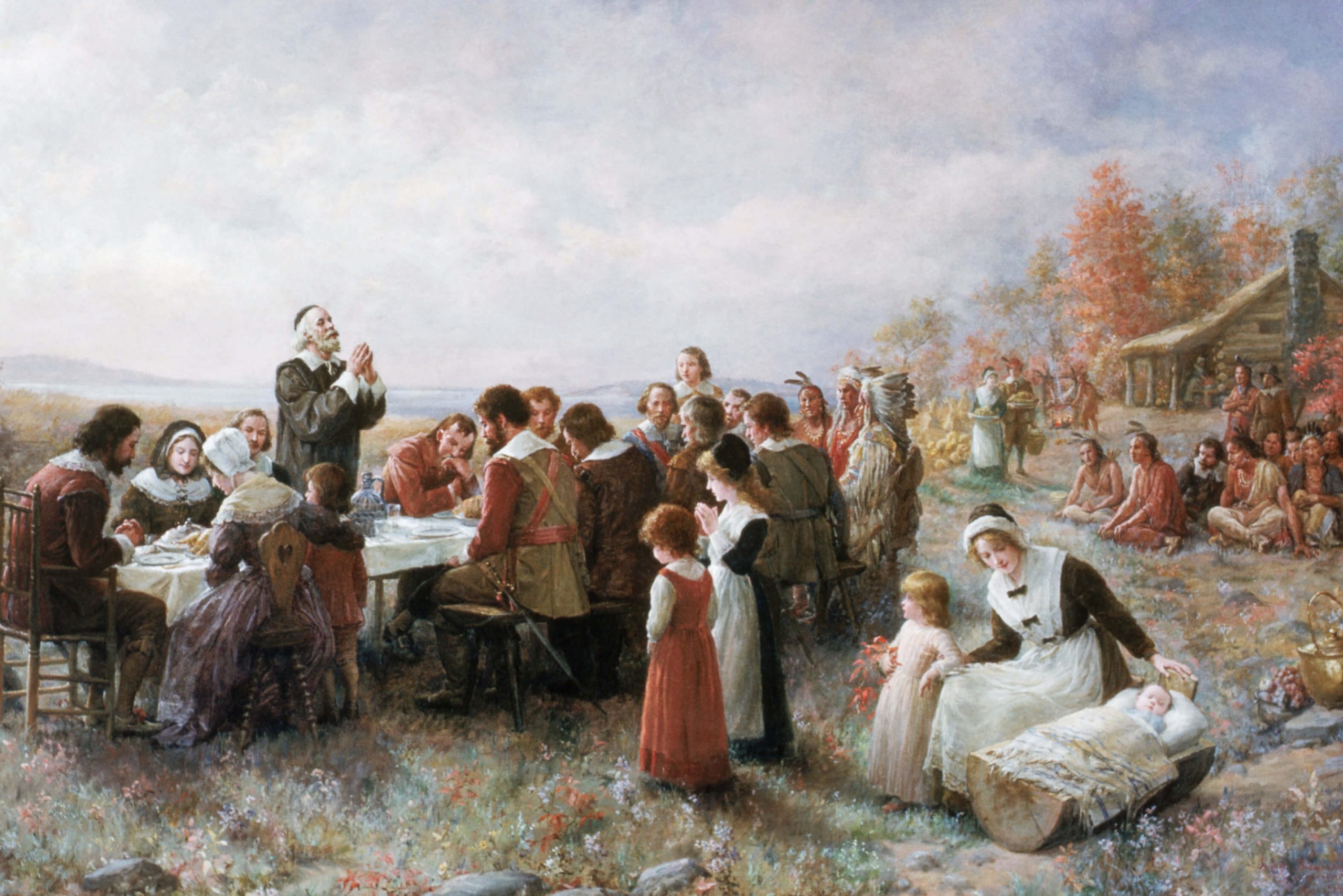

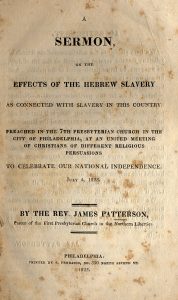

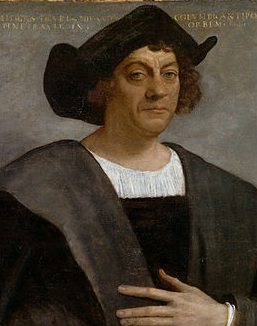 Christopher Columbus. The name invokes images of either a brave and triumphant explorer discovering the New World, or a tyrannical and genocidal leader who was directly responsible for the death of millions. But which image is the truth?
Christopher Columbus. The name invokes images of either a brave and triumphant explorer discovering the New World, or a tyrannical and genocidal leader who was directly responsible for the death of millions. But which image is the truth?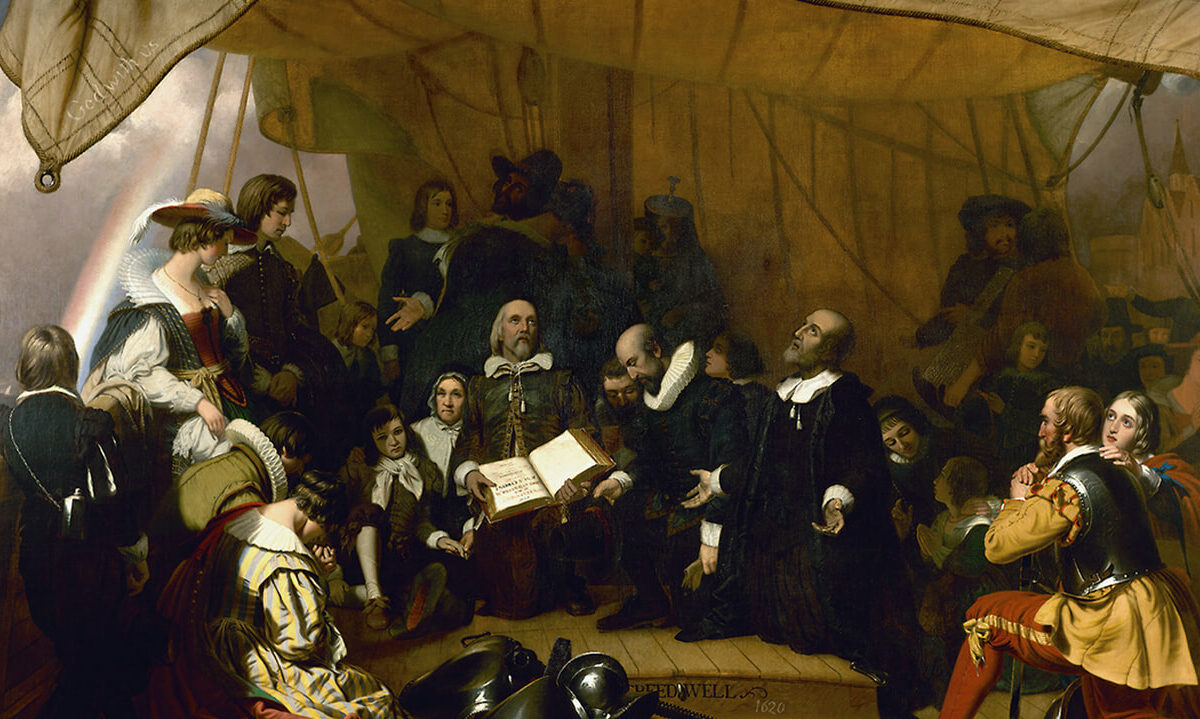
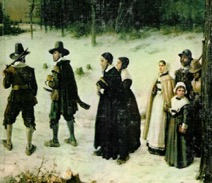 The Pilgrims were mainly English Dissenters who attended churches that did not belong to the Church of England. One
The Pilgrims were mainly English Dissenters who attended churches that did not belong to the Church of England. One 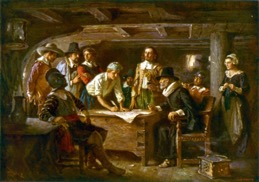 (Their trip across the Atlantic was treacherous, with constant storms. In fact, at one point the
(Their trip across the Atlantic was treacherous, with constant storms. In fact, at one point the 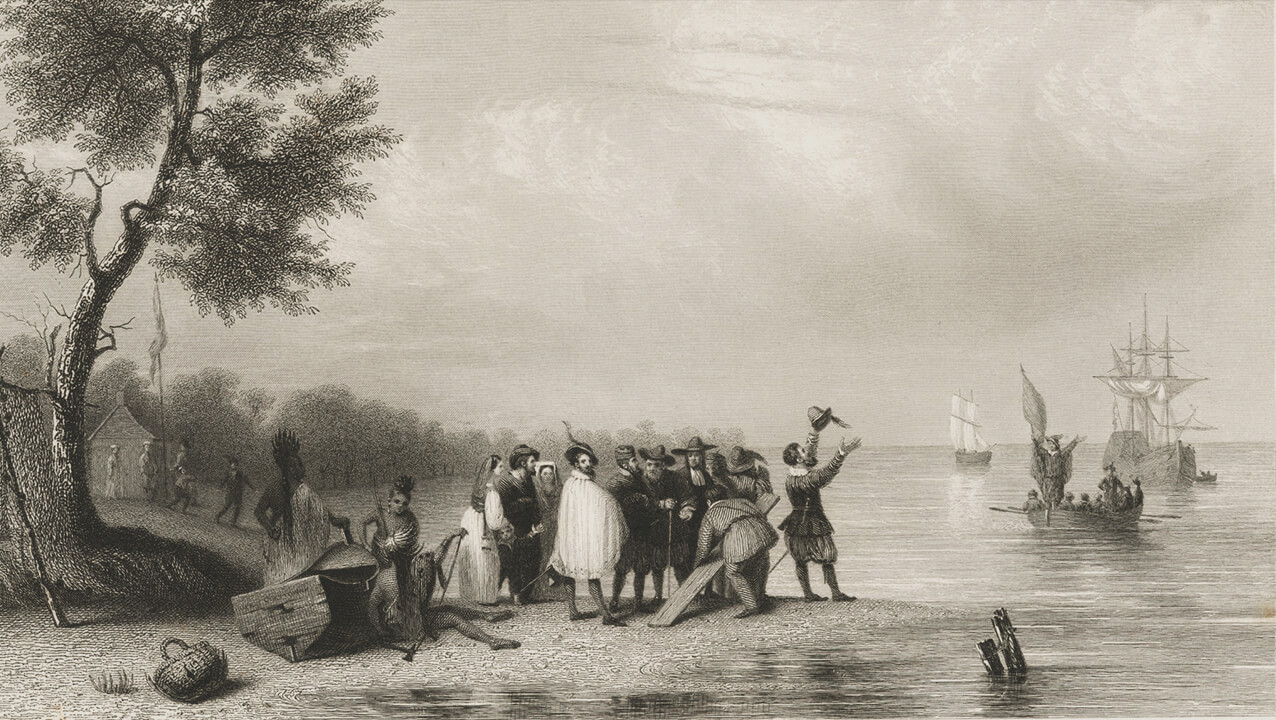
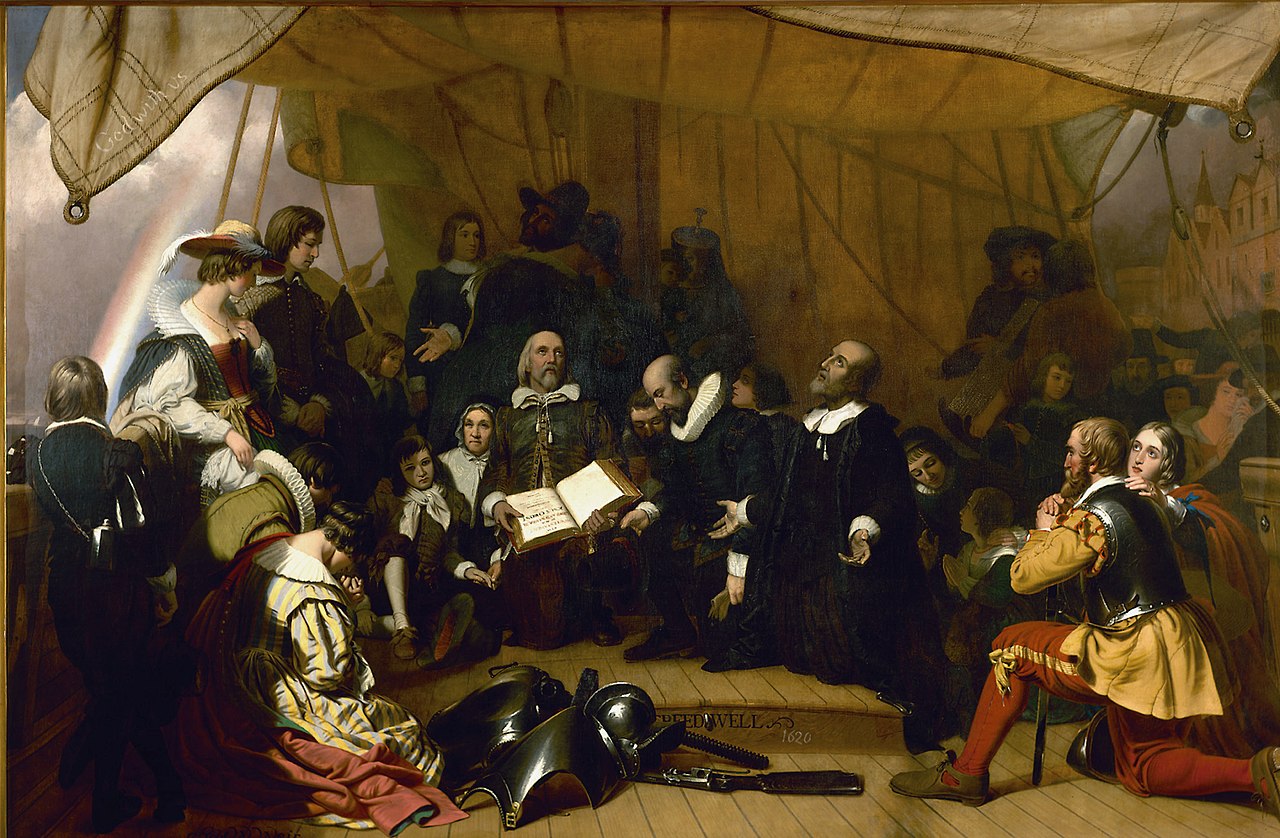
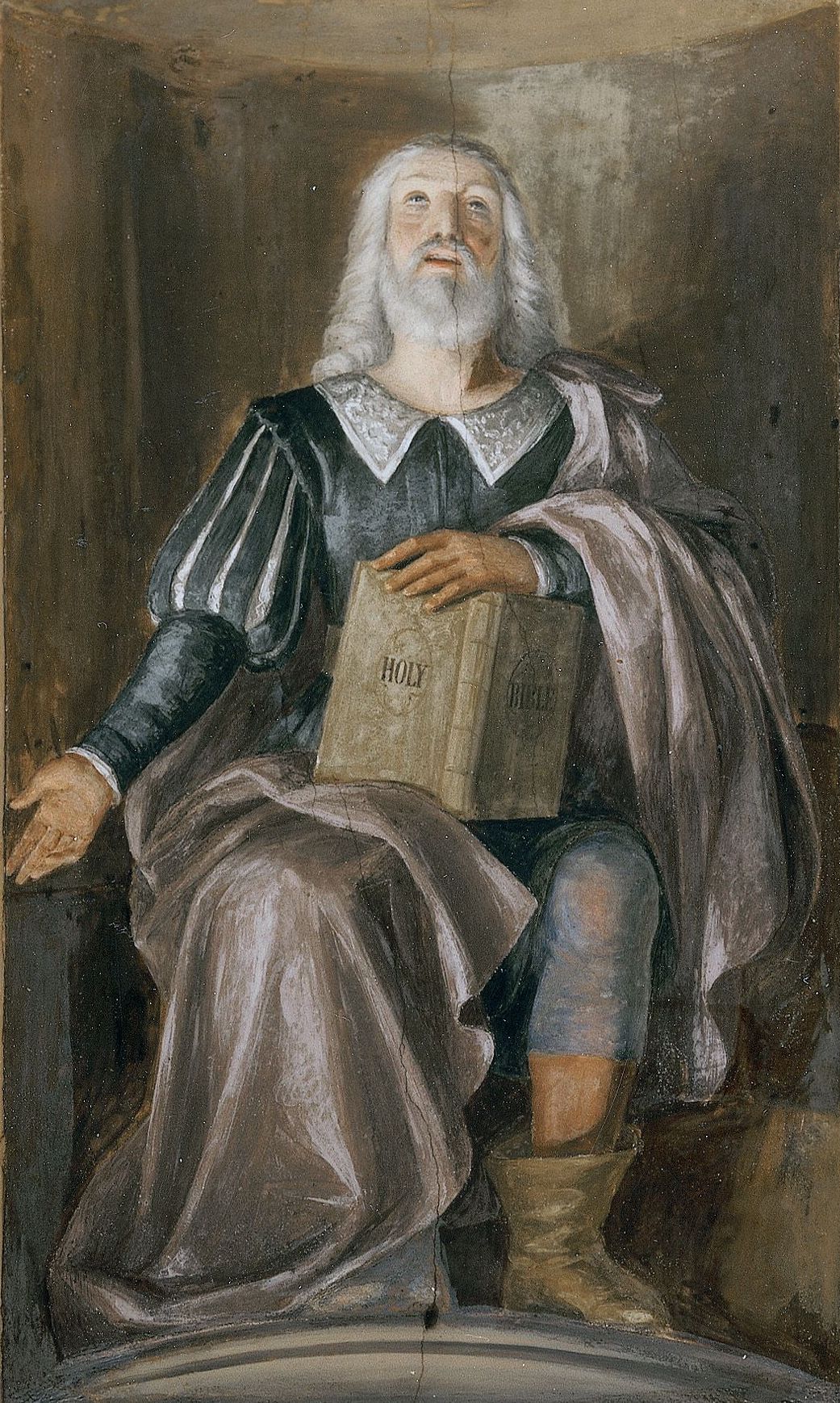
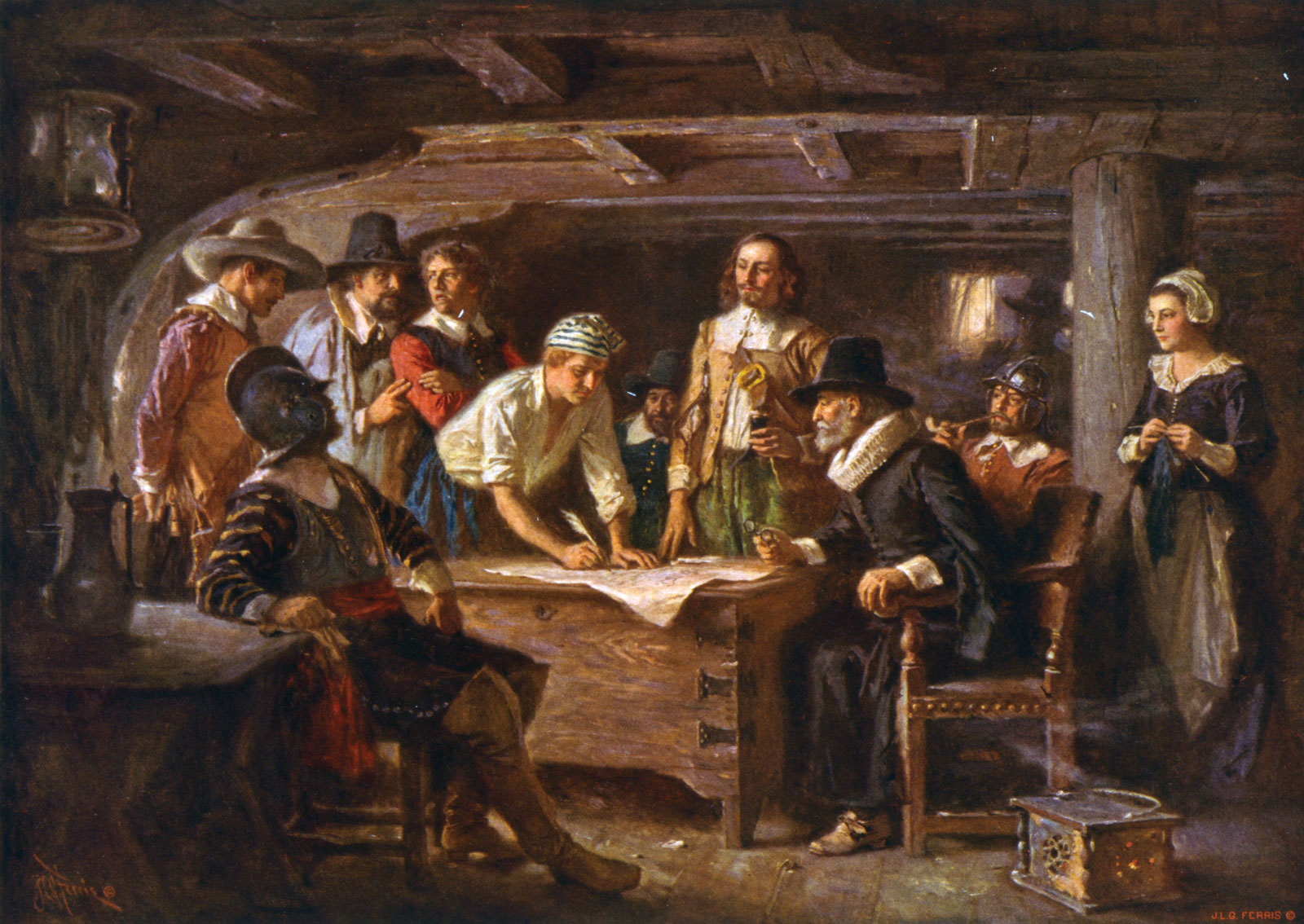
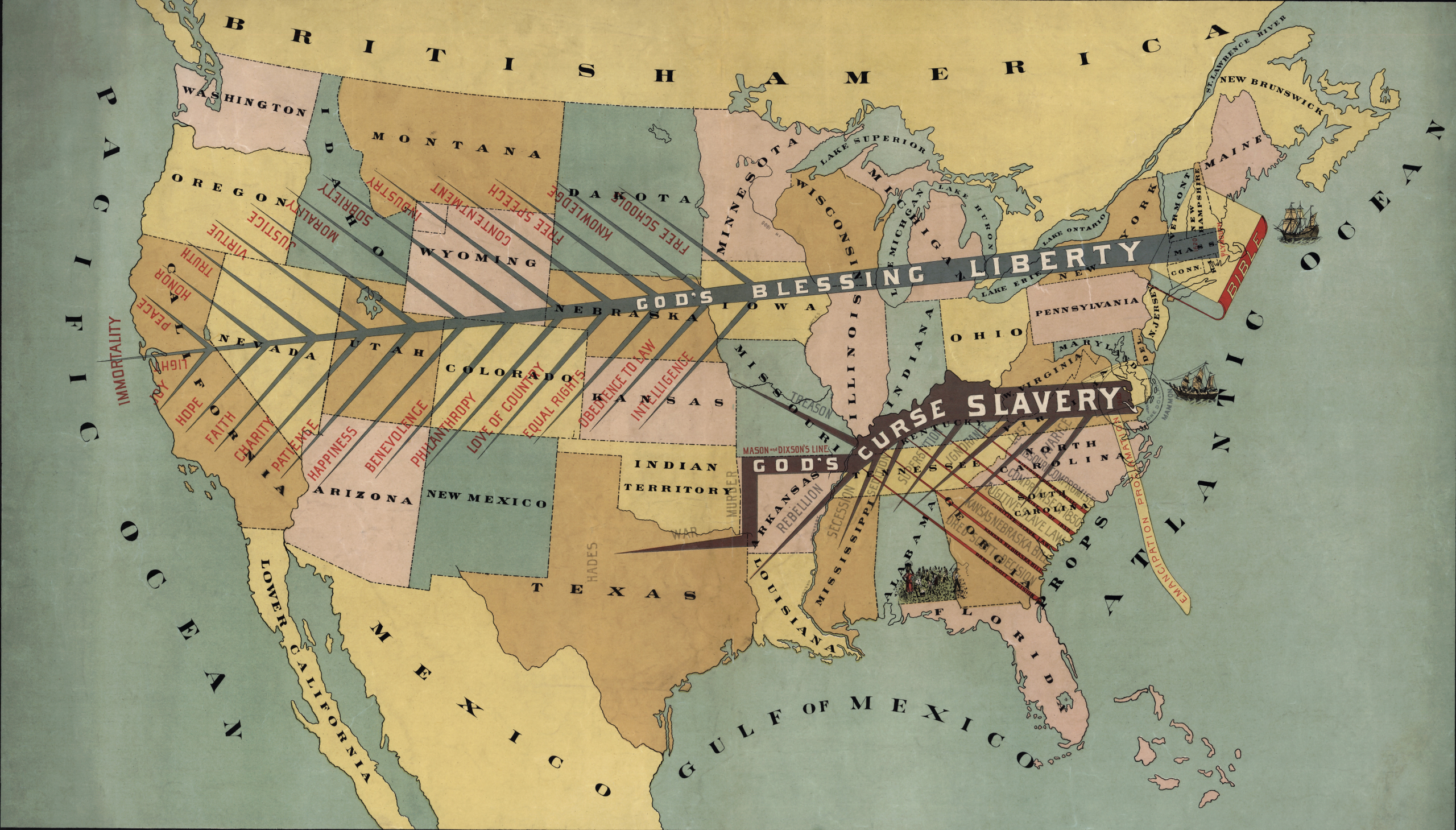 This map from 1888 perfectly illustrates this duality in the American identity—a tale of two cities. The map was created only a generation after the Civil War, which itself was but the cataclysmic struggle between the heirs of the differing philosophies of Jamestown and Plymouth. Designed to teach their children about the history behind the war, it traces the heritage for the South back to Jamestown and the North to Plymouth. Going further, the map highlights the fundamental difference between purpose of founding each colony. While Jamestown was established for mammon [worldly riches], Plymouth was planted upon the Bible.
This map from 1888 perfectly illustrates this duality in the American identity—a tale of two cities. The map was created only a generation after the Civil War, which itself was but the cataclysmic struggle between the heirs of the differing philosophies of Jamestown and Plymouth. Designed to teach their children about the history behind the war, it traces the heritage for the South back to Jamestown and the North to Plymouth. Going further, the map highlights the fundamental difference between purpose of founding each colony. While Jamestown was established for mammon [worldly riches], Plymouth was planted upon the Bible.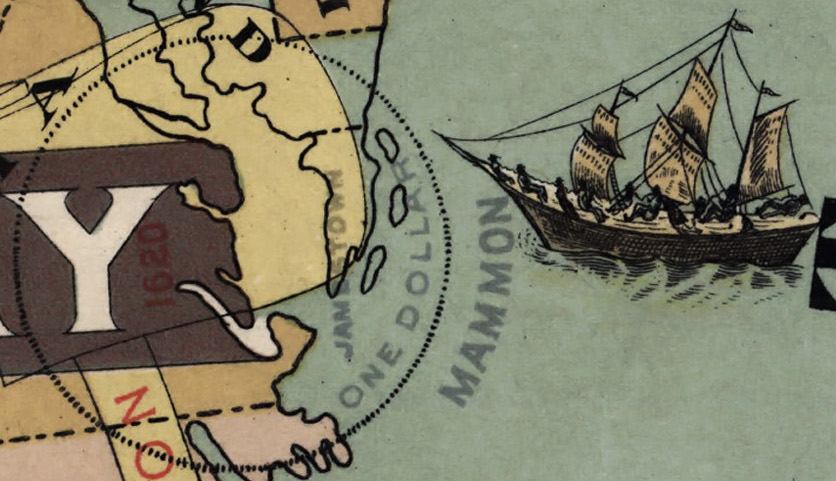
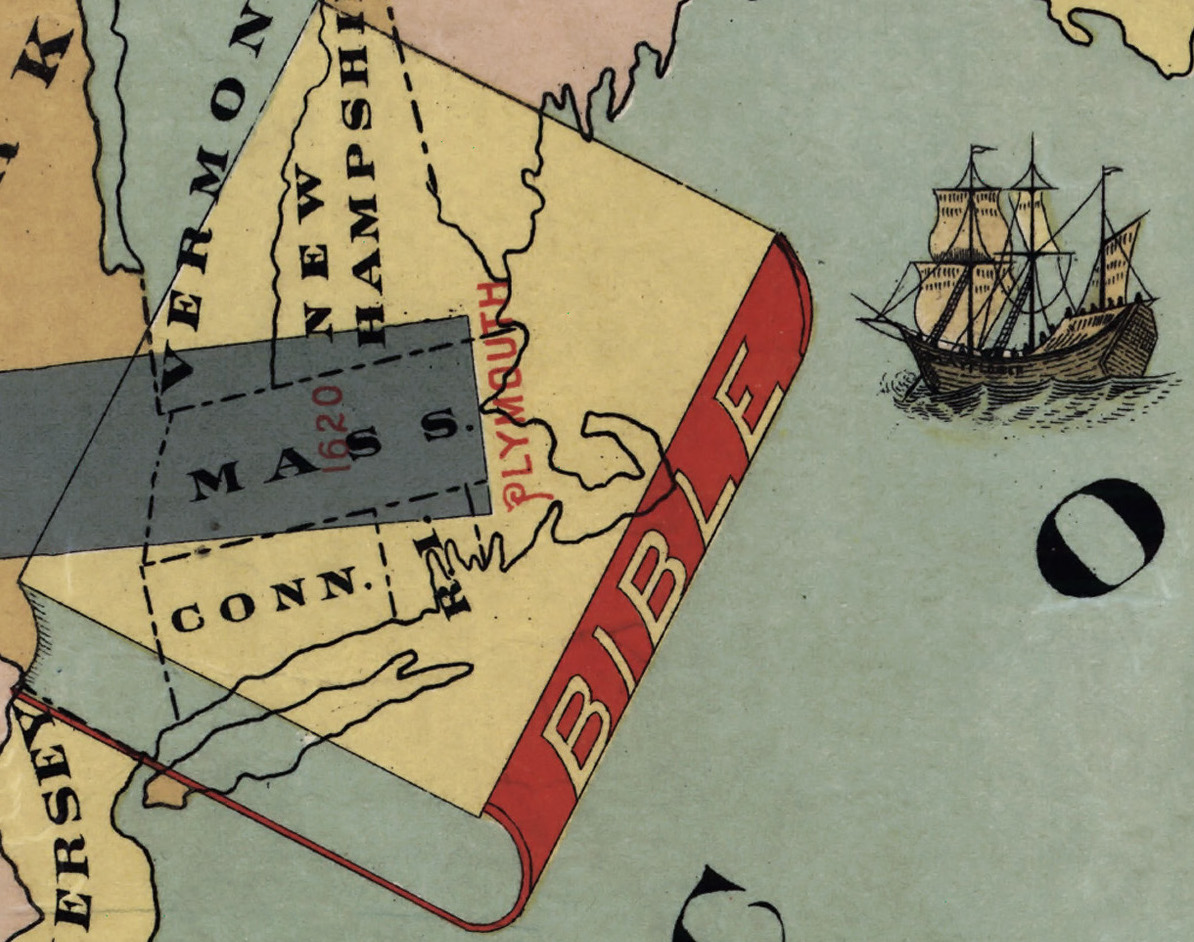

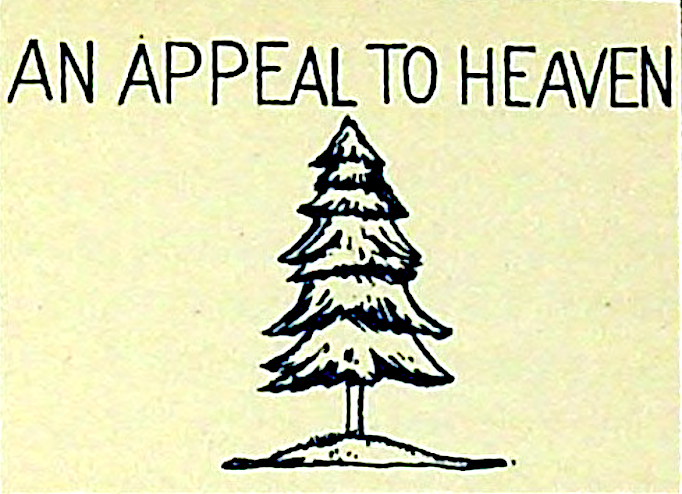 During the early days of the War for Independence—while the gun smoke still covered the fields at Lexington and Concord, and the cannons still echoed at Bunker Hill—America faced innumerable difficulties and a host of hard decisions. Unsurprisingly, the choice of a national flag remained unanswered for many months due to more pressing issues such as arranging a defense and forming the government.
During the early days of the War for Independence—while the gun smoke still covered the fields at Lexington and Concord, and the cannons still echoed at Bunker Hill—America faced innumerable difficulties and a host of hard decisions. Unsurprisingly, the choice of a national flag remained unanswered for many months due to more pressing issues such as arranging a defense and forming the government.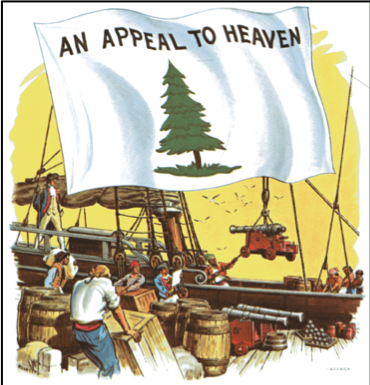 In fact, prior to the Declaration of Independence but after the opening of hostilities, the Pinetree Flag was one of the most popular flags for American troops. Indeed, “there are recorded in the history of those days many instances of the use of the pine-tree flag between October, 1775, and July, 1776.”
In fact, prior to the Declaration of Independence but after the opening of hostilities, the Pinetree Flag was one of the most popular flags for American troops. Indeed, “there are recorded in the history of those days many instances of the use of the pine-tree flag between October, 1775, and July, 1776.”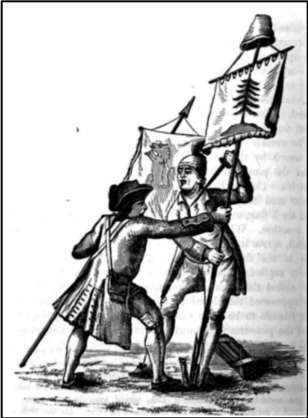 As the skirmishes unfolded into all out warfare between the colonists and England, the Pinetree Flag with its prayer to God became synonymous with the American struggle for liberty. An early map of Boston reflected this by showing a side image of a British redcoat trying to rip this flag out of the hands of a colonist (see image on right).
As the skirmishes unfolded into all out warfare between the colonists and England, the Pinetree Flag with its prayer to God became synonymous with the American struggle for liberty. An early map of Boston reflected this by showing a side image of a British redcoat trying to rip this flag out of the hands of a colonist (see image on right).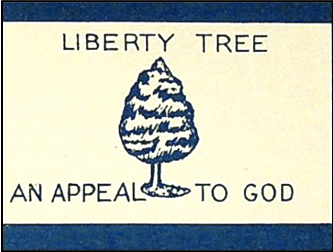 The fact that Locke writes extensively concerning the right to a just revolution as an appeal to Heaven becomes massively important to the American colonists as England begins to strip away their rights. The influence of his Second Treatise of Government (which contains his explanation of an appeal to Heaven) on early America is well documented. During the 1760s and 1770s, the Founding Fathers quoted Locke more than any other political author, amounting to a total of 11% and 7% respectively of all total citations during those formative decades.
The fact that Locke writes extensively concerning the right to a just revolution as an appeal to Heaven becomes massively important to the American colonists as England begins to strip away their rights. The influence of his Second Treatise of Government (which contains his explanation of an appeal to Heaven) on early America is well documented. During the 1760s and 1770s, the Founding Fathers quoted Locke more than any other political author, amounting to a total of 11% and 7% respectively of all total citations during those formative decades.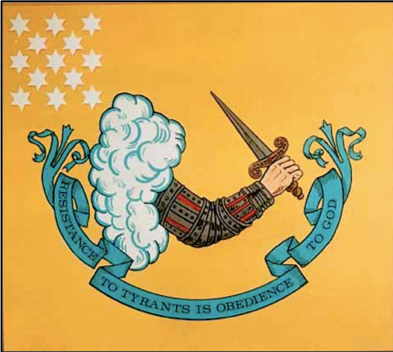 Furthermore, the Pinetree Flag was far from being the only national symbol recognizing America’s reliance on the protection and Providence of God. During the War for Independence other mottos and rallying cries included similar sentiments. For example, the flag pictured on the right bore the phrase “Resistance to Tyrants is Obedience to God,” which came from an earlier 1750 sermon by the influential Rev. Jonathan Mayhew.
Furthermore, the Pinetree Flag was far from being the only national symbol recognizing America’s reliance on the protection and Providence of God. During the War for Independence other mottos and rallying cries included similar sentiments. For example, the flag pictured on the right bore the phrase “Resistance to Tyrants is Obedience to God,” which came from an earlier 1750 sermon by the influential Rev. Jonathan Mayhew.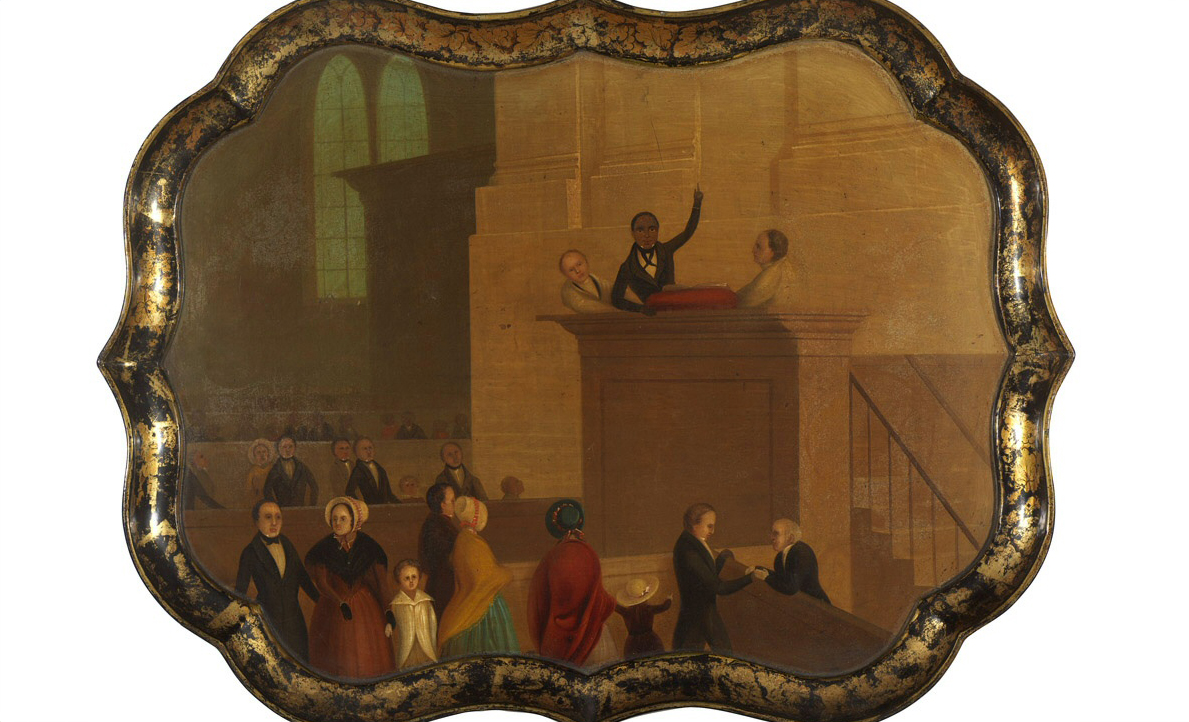
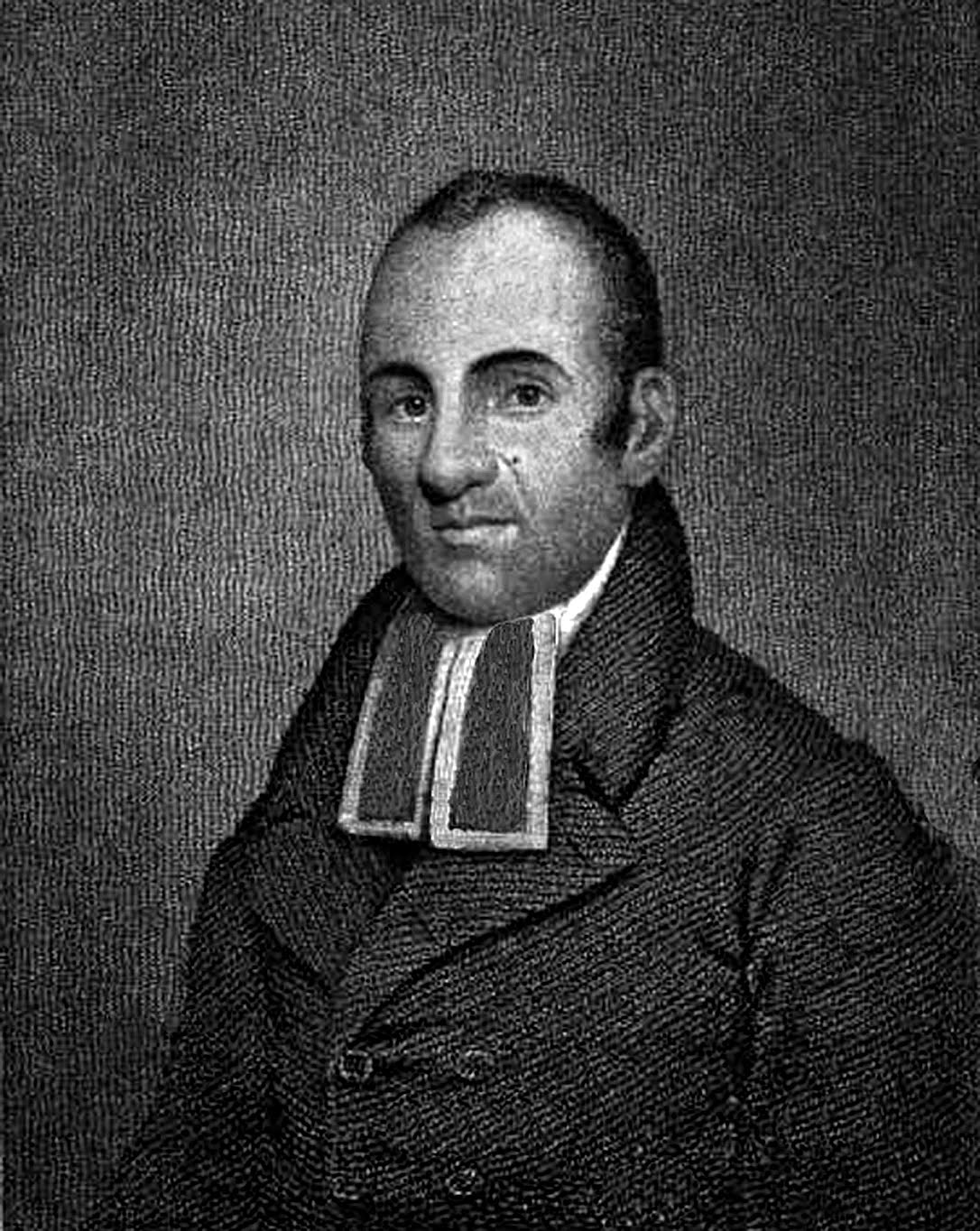

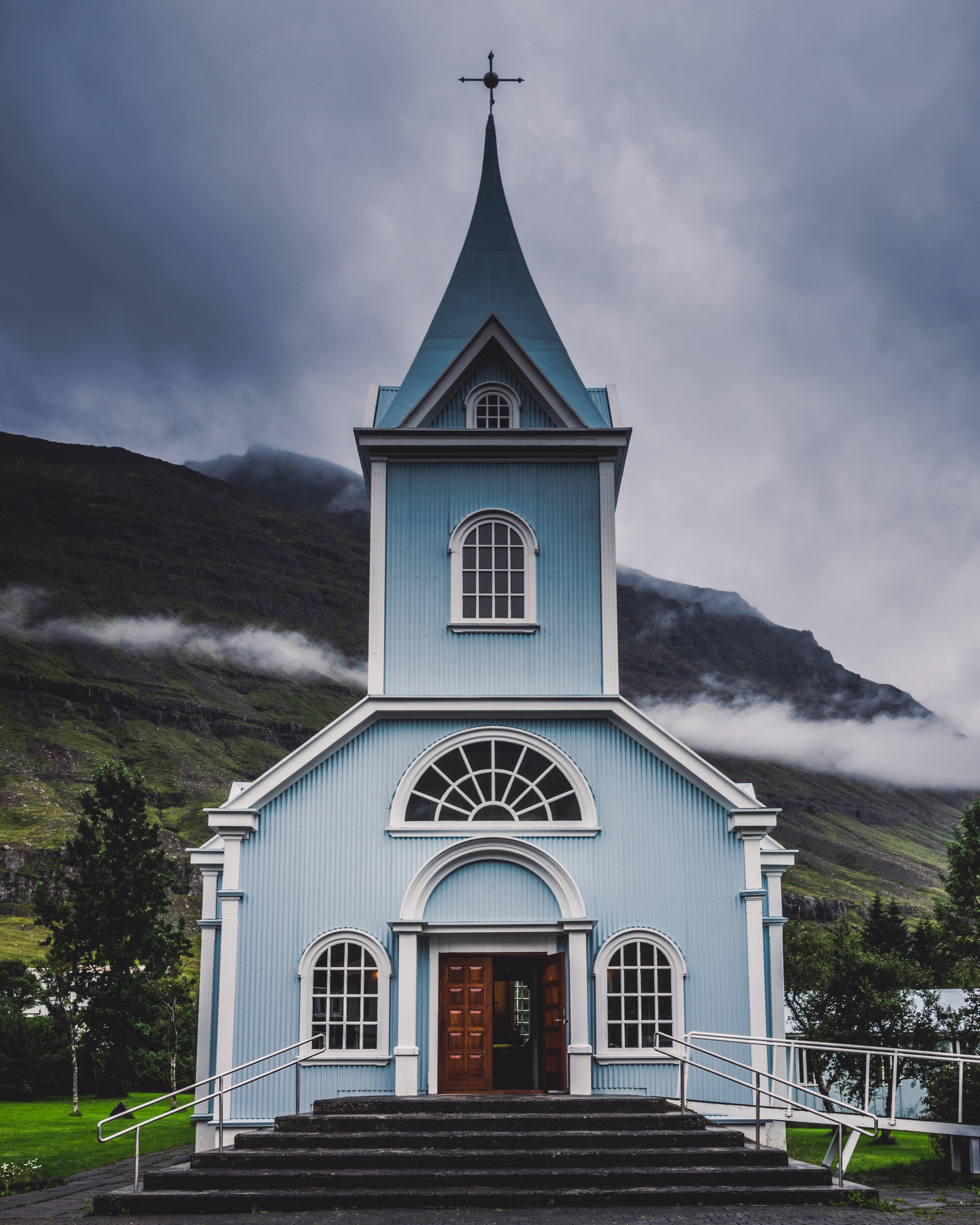 Throughout both American and world history, the Church has arisen and become a much-needed leader in times of crisis. The COVID-19 pandemic provides us another such opportunity to be a shining light to people and communities. Gratefully, we have seen many churches across the nation rolling up their sleeves and taking the lead in extending God’s love to others and truly helping those in need during this difficult time.
Throughout both American and world history, the Church has arisen and become a much-needed leader in times of crisis. The COVID-19 pandemic provides us another such opportunity to be a shining light to people and communities. Gratefully, we have seen many churches across the nation rolling up their sleeves and taking the lead in extending God’s love to others and truly helping those in need during this difficult time. Assist working parents.
Assist working parents.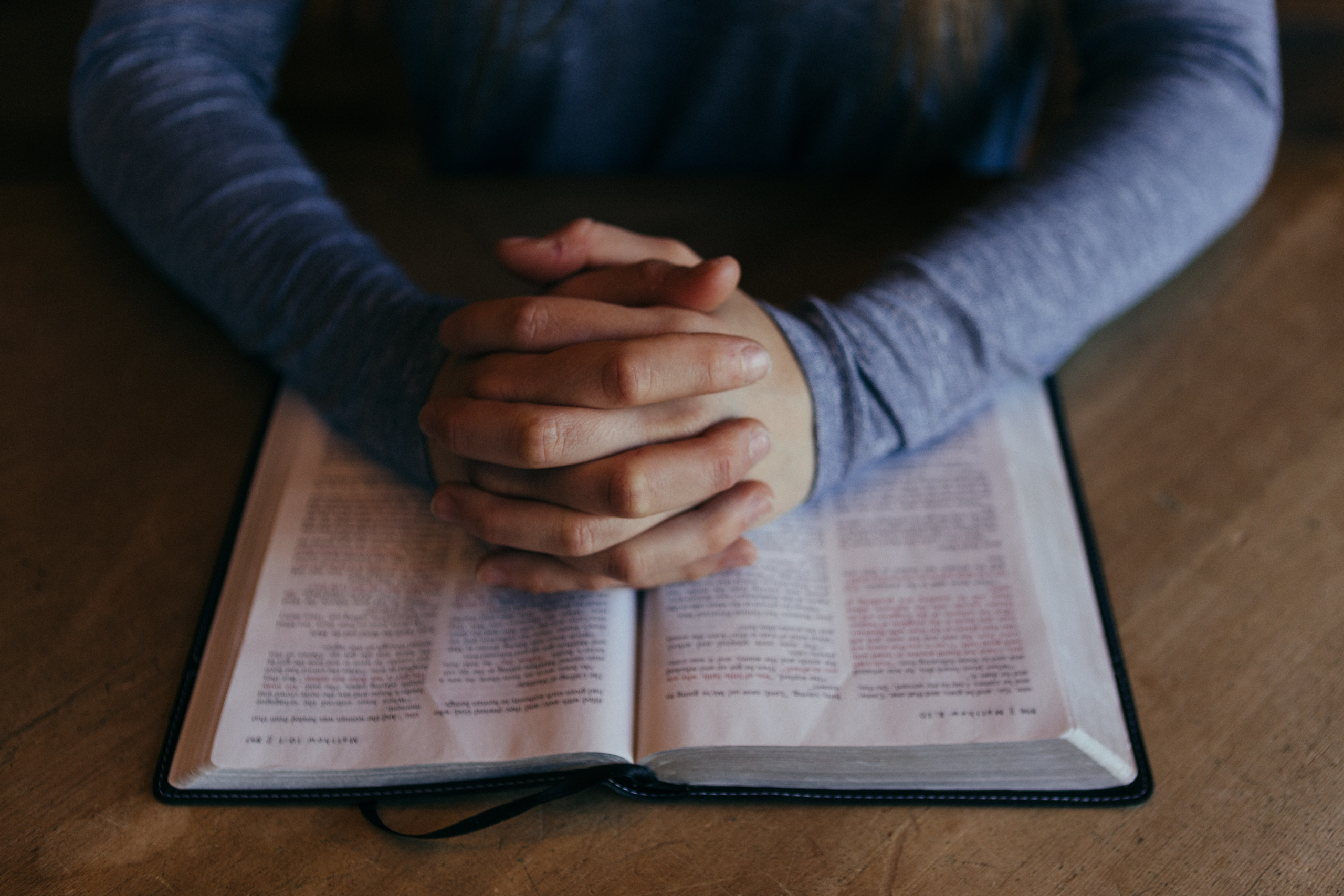 Activate people to keep praying.
Activate people to keep praying.